Research Proposal
VerifiedAdded on 2022/11/30
|20
|5366
|7
AI Summary
Contribute Materials
Your contribution can guide someone’s learning journey. Share your
documents today.

Research Proposal
Table of Contents
Table of Contents
Secure Best Marks with AI Grader
Need help grading? Try our AI Grader for instant feedback on your assignments.
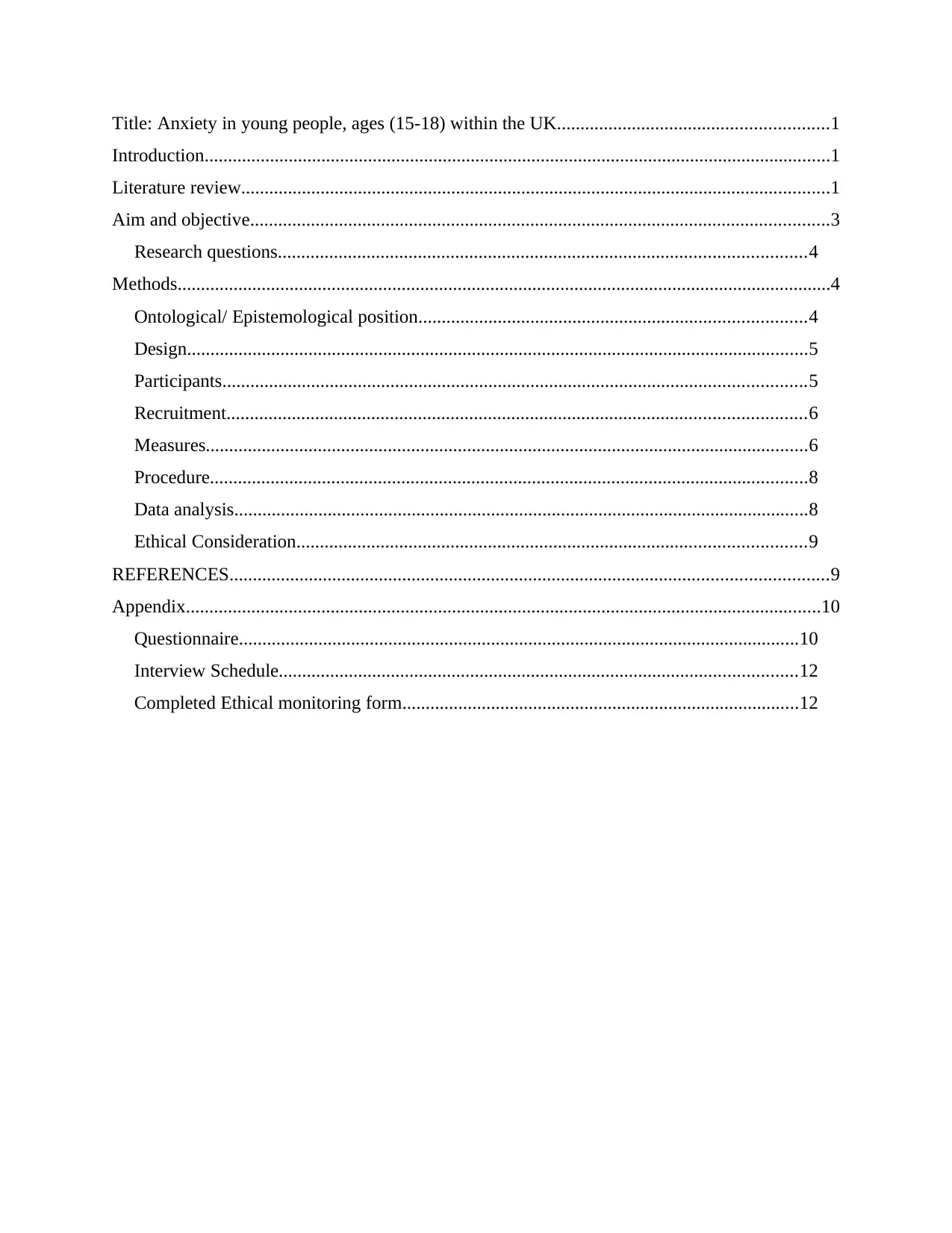
Title: Anxiety in young people, ages (15-18) within the UK..........................................................1
Introduction......................................................................................................................................1
Literature review..............................................................................................................................1
Aim and objective............................................................................................................................3
Research questions.................................................................................................................4
Methods............................................................................................................................................4
Ontological/ Epistemological position...................................................................................4
Design.....................................................................................................................................5
Participants.............................................................................................................................5
Recruitment............................................................................................................................6
Measures.................................................................................................................................6
Procedure................................................................................................................................8
Data analysis...........................................................................................................................8
Ethical Consideration.............................................................................................................9
REFERENCES................................................................................................................................9
Appendix........................................................................................................................................10
Questionnaire........................................................................................................................10
Interview Schedule...............................................................................................................12
Completed Ethical monitoring form.....................................................................................12
Introduction......................................................................................................................................1
Literature review..............................................................................................................................1
Aim and objective............................................................................................................................3
Research questions.................................................................................................................4
Methods............................................................................................................................................4
Ontological/ Epistemological position...................................................................................4
Design.....................................................................................................................................5
Participants.............................................................................................................................5
Recruitment............................................................................................................................6
Measures.................................................................................................................................6
Procedure................................................................................................................................8
Data analysis...........................................................................................................................8
Ethical Consideration.............................................................................................................9
REFERENCES................................................................................................................................9
Appendix........................................................................................................................................10
Questionnaire........................................................................................................................10
Interview Schedule...............................................................................................................12
Completed Ethical monitoring form.....................................................................................12
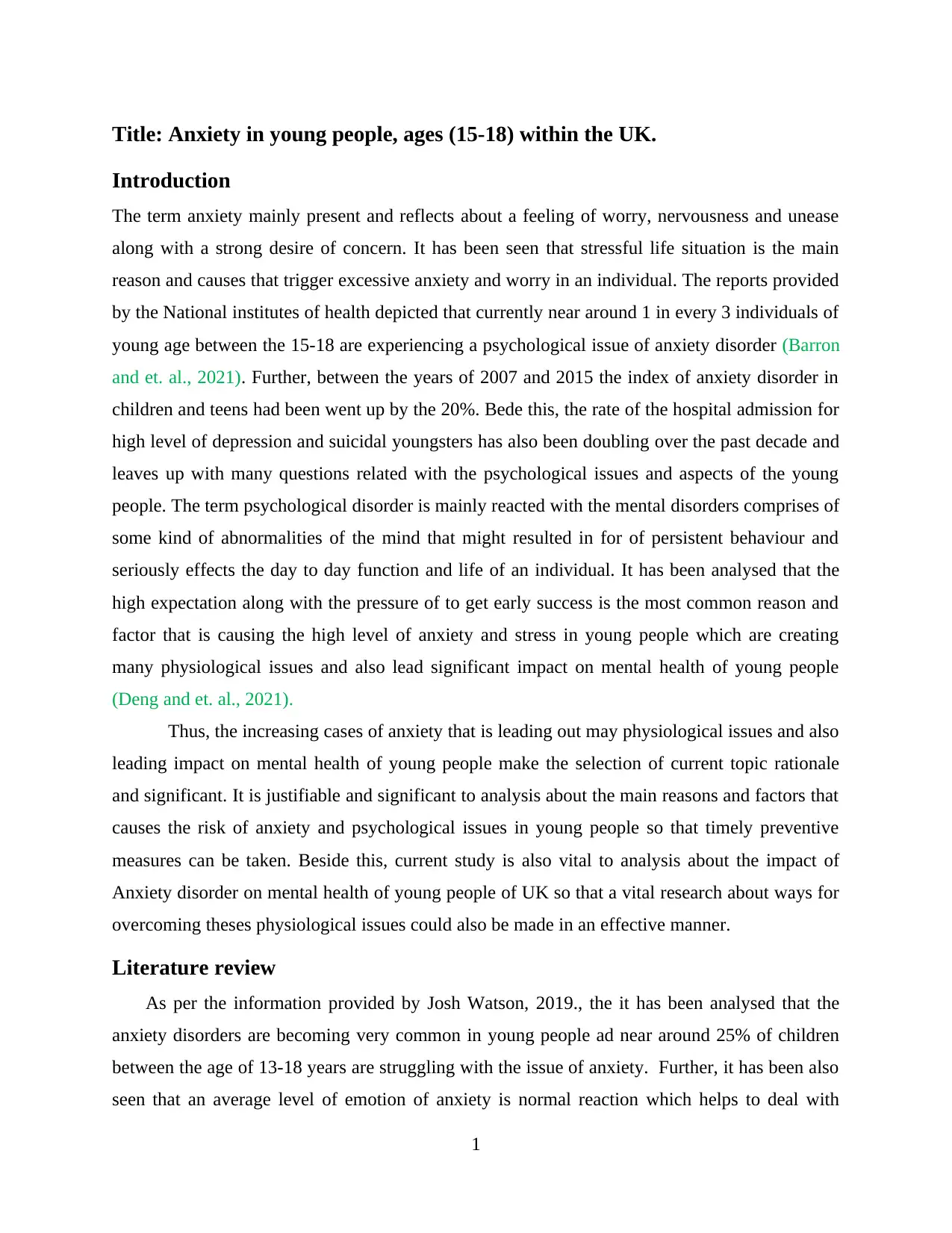
Title: Anxiety in young people, ages (15-18) within the UK.
Introduction
The term anxiety mainly present and reflects about a feeling of worry, nervousness and unease
along with a strong desire of concern. It has been seen that stressful life situation is the main
reason and causes that trigger excessive anxiety and worry in an individual. The reports provided
by the National institutes of health depicted that currently near around 1 in every 3 individuals of
young age between the 15-18 are experiencing a psychological issue of anxiety disorder (Barron
and et. al., 2021). Further, between the years of 2007 and 2015 the index of anxiety disorder in
children and teens had been went up by the 20%. Bede this, the rate of the hospital admission for
high level of depression and suicidal youngsters has also been doubling over the past decade and
leaves up with many questions related with the psychological issues and aspects of the young
people. The term psychological disorder is mainly reacted with the mental disorders comprises of
some kind of abnormalities of the mind that might resulted in for of persistent behaviour and
seriously effects the day to day function and life of an individual. It has been analysed that the
high expectation along with the pressure of to get early success is the most common reason and
factor that is causing the high level of anxiety and stress in young people which are creating
many physiological issues and also lead significant impact on mental health of young people
(Deng and et. al., 2021).
Thus, the increasing cases of anxiety that is leading out may physiological issues and also
leading impact on mental health of young people make the selection of current topic rationale
and significant. It is justifiable and significant to analysis about the main reasons and factors that
causes the risk of anxiety and psychological issues in young people so that timely preventive
measures can be taken. Beside this, current study is also vital to analysis about the impact of
Anxiety disorder on mental health of young people of UK so that a vital research about ways for
overcoming theses physiological issues could also be made in an effective manner.
Literature review
As per the information provided by Josh Watson, 2019., the it has been analysed that the
anxiety disorders are becoming very common in young people ad near around 25% of children
between the age of 13-18 years are struggling with the issue of anxiety. Further, it has been also
seen that an average level of emotion of anxiety is normal reaction which helps to deal with
1
Introduction
The term anxiety mainly present and reflects about a feeling of worry, nervousness and unease
along with a strong desire of concern. It has been seen that stressful life situation is the main
reason and causes that trigger excessive anxiety and worry in an individual. The reports provided
by the National institutes of health depicted that currently near around 1 in every 3 individuals of
young age between the 15-18 are experiencing a psychological issue of anxiety disorder (Barron
and et. al., 2021). Further, between the years of 2007 and 2015 the index of anxiety disorder in
children and teens had been went up by the 20%. Bede this, the rate of the hospital admission for
high level of depression and suicidal youngsters has also been doubling over the past decade and
leaves up with many questions related with the psychological issues and aspects of the young
people. The term psychological disorder is mainly reacted with the mental disorders comprises of
some kind of abnormalities of the mind that might resulted in for of persistent behaviour and
seriously effects the day to day function and life of an individual. It has been analysed that the
high expectation along with the pressure of to get early success is the most common reason and
factor that is causing the high level of anxiety and stress in young people which are creating
many physiological issues and also lead significant impact on mental health of young people
(Deng and et. al., 2021).
Thus, the increasing cases of anxiety that is leading out may physiological issues and also
leading impact on mental health of young people make the selection of current topic rationale
and significant. It is justifiable and significant to analysis about the main reasons and factors that
causes the risk of anxiety and psychological issues in young people so that timely preventive
measures can be taken. Beside this, current study is also vital to analysis about the impact of
Anxiety disorder on mental health of young people of UK so that a vital research about ways for
overcoming theses physiological issues could also be made in an effective manner.
Literature review
As per the information provided by Josh Watson, 2019., the it has been analysed that the
anxiety disorders are becoming very common in young people ad near around 25% of children
between the age of 13-18 years are struggling with the issue of anxiety. Further, it has been also
seen that an average level of emotion of anxiety is normal reaction which helps to deal with
1
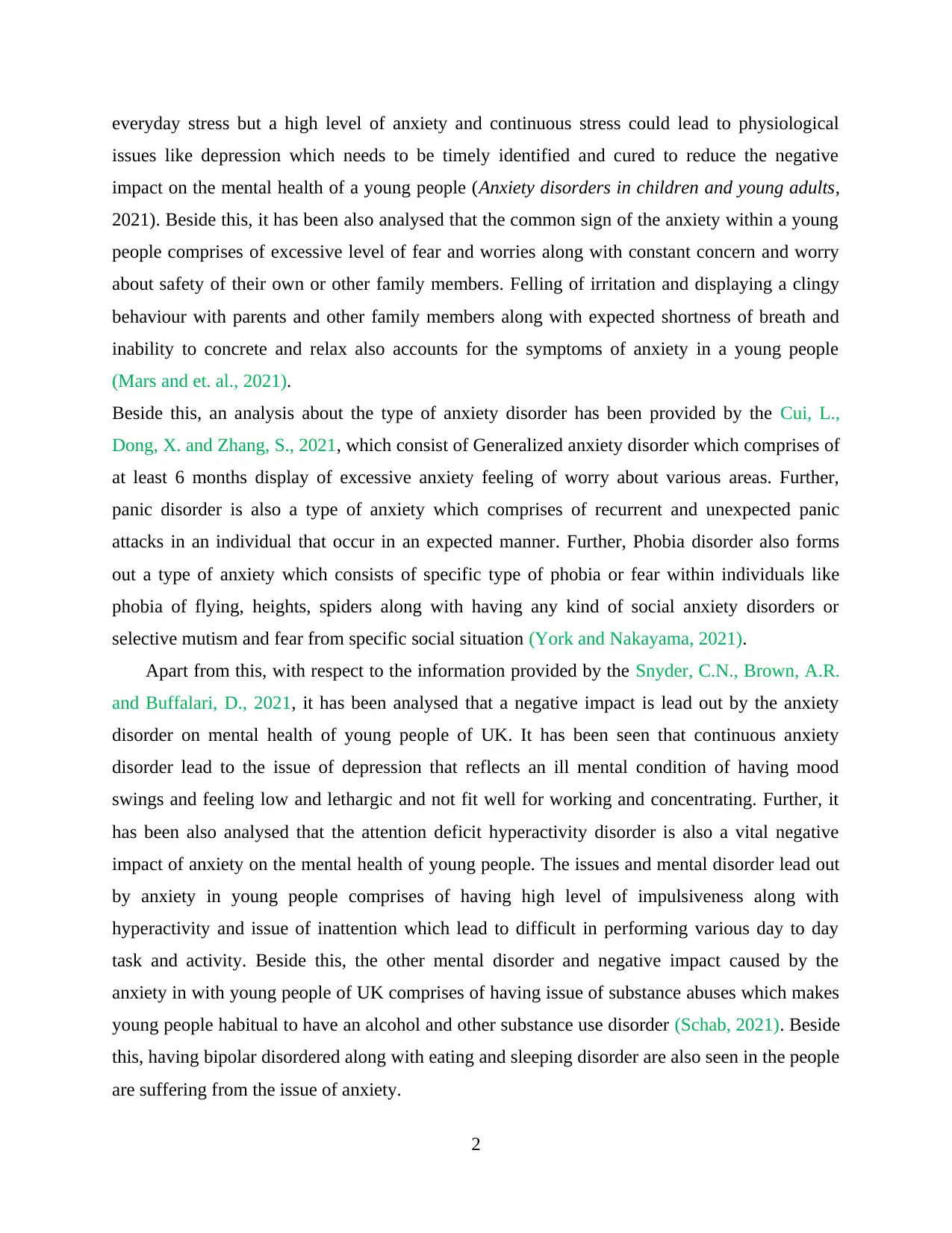
everyday stress but a high level of anxiety and continuous stress could lead to physiological
issues like depression which needs to be timely identified and cured to reduce the negative
impact on the mental health of a young people (Anxiety disorders in children and young adults,
2021). Beside this, it has been also analysed that the common sign of the anxiety within a young
people comprises of excessive level of fear and worries along with constant concern and worry
about safety of their own or other family members. Felling of irritation and displaying a clingy
behaviour with parents and other family members along with expected shortness of breath and
inability to concrete and relax also accounts for the symptoms of anxiety in a young people
(Mars and et. al., 2021).
Beside this, an analysis about the type of anxiety disorder has been provided by the Cui, L.,
Dong, X. and Zhang, S., 2021, which consist of Generalized anxiety disorder which comprises of
at least 6 months display of excessive anxiety feeling of worry about various areas. Further,
panic disorder is also a type of anxiety which comprises of recurrent and unexpected panic
attacks in an individual that occur in an expected manner. Further, Phobia disorder also forms
out a type of anxiety which consists of specific type of phobia or fear within individuals like
phobia of flying, heights, spiders along with having any kind of social anxiety disorders or
selective mutism and fear from specific social situation (York and Nakayama, 2021).
Apart from this, with respect to the information provided by the Snyder, C.N., Brown, A.R.
and Buffalari, D., 2021, it has been analysed that a negative impact is lead out by the anxiety
disorder on mental health of young people of UK. It has been seen that continuous anxiety
disorder lead to the issue of depression that reflects an ill mental condition of having mood
swings and feeling low and lethargic and not fit well for working and concentrating. Further, it
has been also analysed that the attention deficit hyperactivity disorder is also a vital negative
impact of anxiety on the mental health of young people. The issues and mental disorder lead out
by anxiety in young people comprises of having high level of impulsiveness along with
hyperactivity and issue of inattention which lead to difficult in performing various day to day
task and activity. Beside this, the other mental disorder and negative impact caused by the
anxiety in with young people of UK comprises of having issue of substance abuses which makes
young people habitual to have an alcohol and other substance use disorder (Schab, 2021). Beside
this, having bipolar disordered along with eating and sleeping disorder are also seen in the people
are suffering from the issue of anxiety.
2
issues like depression which needs to be timely identified and cured to reduce the negative
impact on the mental health of a young people (Anxiety disorders in children and young adults,
2021). Beside this, it has been also analysed that the common sign of the anxiety within a young
people comprises of excessive level of fear and worries along with constant concern and worry
about safety of their own or other family members. Felling of irritation and displaying a clingy
behaviour with parents and other family members along with expected shortness of breath and
inability to concrete and relax also accounts for the symptoms of anxiety in a young people
(Mars and et. al., 2021).
Beside this, an analysis about the type of anxiety disorder has been provided by the Cui, L.,
Dong, X. and Zhang, S., 2021, which consist of Generalized anxiety disorder which comprises of
at least 6 months display of excessive anxiety feeling of worry about various areas. Further,
panic disorder is also a type of anxiety which comprises of recurrent and unexpected panic
attacks in an individual that occur in an expected manner. Further, Phobia disorder also forms
out a type of anxiety which consists of specific type of phobia or fear within individuals like
phobia of flying, heights, spiders along with having any kind of social anxiety disorders or
selective mutism and fear from specific social situation (York and Nakayama, 2021).
Apart from this, with respect to the information provided by the Snyder, C.N., Brown, A.R.
and Buffalari, D., 2021, it has been analysed that a negative impact is lead out by the anxiety
disorder on mental health of young people of UK. It has been seen that continuous anxiety
disorder lead to the issue of depression that reflects an ill mental condition of having mood
swings and feeling low and lethargic and not fit well for working and concentrating. Further, it
has been also analysed that the attention deficit hyperactivity disorder is also a vital negative
impact of anxiety on the mental health of young people. The issues and mental disorder lead out
by anxiety in young people comprises of having high level of impulsiveness along with
hyperactivity and issue of inattention which lead to difficult in performing various day to day
task and activity. Beside this, the other mental disorder and negative impact caused by the
anxiety in with young people of UK comprises of having issue of substance abuses which makes
young people habitual to have an alcohol and other substance use disorder (Schab, 2021). Beside
this, having bipolar disordered along with eating and sleeping disorder are also seen in the people
are suffering from the issue of anxiety.
2
Secure Best Marks with AI Grader
Need help grading? Try our AI Grader for instant feedback on your assignments.
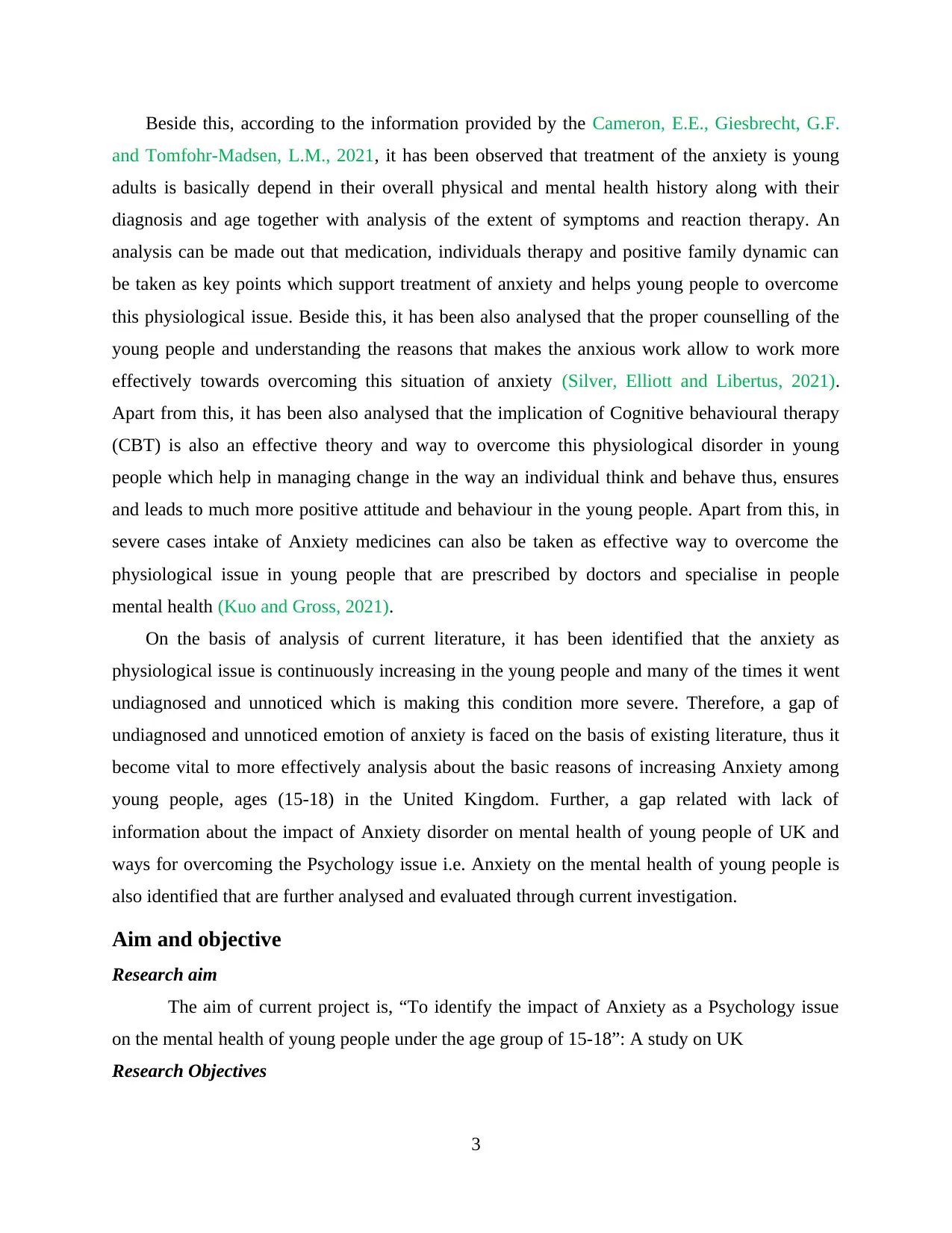
Beside this, according to the information provided by the Cameron, E.E., Giesbrecht, G.F.
and Tomfohr-Madsen, L.M., 2021, it has been observed that treatment of the anxiety is young
adults is basically depend in their overall physical and mental health history along with their
diagnosis and age together with analysis of the extent of symptoms and reaction therapy. An
analysis can be made out that medication, individuals therapy and positive family dynamic can
be taken as key points which support treatment of anxiety and helps young people to overcome
this physiological issue. Beside this, it has been also analysed that the proper counselling of the
young people and understanding the reasons that makes the anxious work allow to work more
effectively towards overcoming this situation of anxiety (Silver, Elliott and Libertus, 2021).
Apart from this, it has been also analysed that the implication of Cognitive behavioural therapy
(CBT) is also an effective theory and way to overcome this physiological disorder in young
people which help in managing change in the way an individual think and behave thus, ensures
and leads to much more positive attitude and behaviour in the young people. Apart from this, in
severe cases intake of Anxiety medicines can also be taken as effective way to overcome the
physiological issue in young people that are prescribed by doctors and specialise in people
mental health (Kuo and Gross, 2021).
On the basis of analysis of current literature, it has been identified that the anxiety as
physiological issue is continuously increasing in the young people and many of the times it went
undiagnosed and unnoticed which is making this condition more severe. Therefore, a gap of
undiagnosed and unnoticed emotion of anxiety is faced on the basis of existing literature, thus it
become vital to more effectively analysis about the basic reasons of increasing Anxiety among
young people, ages (15-18) in the United Kingdom. Further, a gap related with lack of
information about the impact of Anxiety disorder on mental health of young people of UK and
ways for overcoming the Psychology issue i.e. Anxiety on the mental health of young people is
also identified that are further analysed and evaluated through current investigation.
Aim and objective
Research aim
The aim of current project is, “To identify the impact of Anxiety as a Psychology issue
on the mental health of young people under the age group of 15-18”: A study on UK
Research Objectives
3
and Tomfohr-Madsen, L.M., 2021, it has been observed that treatment of the anxiety is young
adults is basically depend in their overall physical and mental health history along with their
diagnosis and age together with analysis of the extent of symptoms and reaction therapy. An
analysis can be made out that medication, individuals therapy and positive family dynamic can
be taken as key points which support treatment of anxiety and helps young people to overcome
this physiological issue. Beside this, it has been also analysed that the proper counselling of the
young people and understanding the reasons that makes the anxious work allow to work more
effectively towards overcoming this situation of anxiety (Silver, Elliott and Libertus, 2021).
Apart from this, it has been also analysed that the implication of Cognitive behavioural therapy
(CBT) is also an effective theory and way to overcome this physiological disorder in young
people which help in managing change in the way an individual think and behave thus, ensures
and leads to much more positive attitude and behaviour in the young people. Apart from this, in
severe cases intake of Anxiety medicines can also be taken as effective way to overcome the
physiological issue in young people that are prescribed by doctors and specialise in people
mental health (Kuo and Gross, 2021).
On the basis of analysis of current literature, it has been identified that the anxiety as
physiological issue is continuously increasing in the young people and many of the times it went
undiagnosed and unnoticed which is making this condition more severe. Therefore, a gap of
undiagnosed and unnoticed emotion of anxiety is faced on the basis of existing literature, thus it
become vital to more effectively analysis about the basic reasons of increasing Anxiety among
young people, ages (15-18) in the United Kingdom. Further, a gap related with lack of
information about the impact of Anxiety disorder on mental health of young people of UK and
ways for overcoming the Psychology issue i.e. Anxiety on the mental health of young people is
also identified that are further analysed and evaluated through current investigation.
Aim and objective
Research aim
The aim of current project is, “To identify the impact of Anxiety as a Psychology issue
on the mental health of young people under the age group of 15-18”: A study on UK
Research Objectives
3
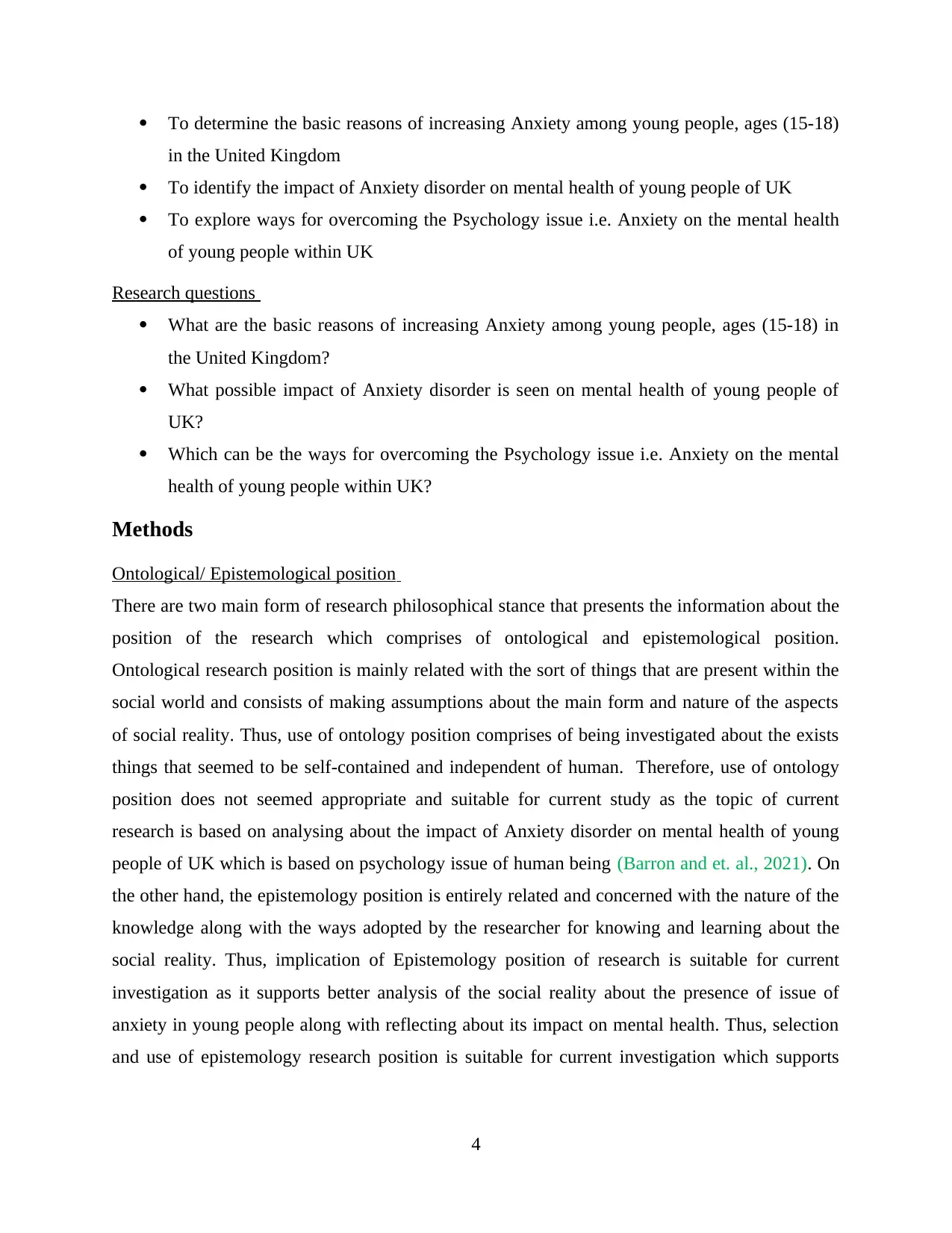
To determine the basic reasons of increasing Anxiety among young people, ages (15-18)
in the United Kingdom
To identify the impact of Anxiety disorder on mental health of young people of UK
To explore ways for overcoming the Psychology issue i.e. Anxiety on the mental health
of young people within UK
Research questions
What are the basic reasons of increasing Anxiety among young people, ages (15-18) in
the United Kingdom?
What possible impact of Anxiety disorder is seen on mental health of young people of
UK?
Which can be the ways for overcoming the Psychology issue i.e. Anxiety on the mental
health of young people within UK?
Methods
Ontological/ Epistemological position
There are two main form of research philosophical stance that presents the information about the
position of the research which comprises of ontological and epistemological position.
Ontological research position is mainly related with the sort of things that are present within the
social world and consists of making assumptions about the main form and nature of the aspects
of social reality. Thus, use of ontology position comprises of being investigated about the exists
things that seemed to be self-contained and independent of human. Therefore, use of ontology
position does not seemed appropriate and suitable for current study as the topic of current
research is based on analysing about the impact of Anxiety disorder on mental health of young
people of UK which is based on psychology issue of human being (Barron and et. al., 2021). On
the other hand, the epistemology position is entirely related and concerned with the nature of the
knowledge along with the ways adopted by the researcher for knowing and learning about the
social reality. Thus, implication of Epistemology position of research is suitable for current
investigation as it supports better analysis of the social reality about the presence of issue of
anxiety in young people along with reflecting about its impact on mental health. Thus, selection
and use of epistemology research position is suitable for current investigation which supports
4
in the United Kingdom
To identify the impact of Anxiety disorder on mental health of young people of UK
To explore ways for overcoming the Psychology issue i.e. Anxiety on the mental health
of young people within UK
Research questions
What are the basic reasons of increasing Anxiety among young people, ages (15-18) in
the United Kingdom?
What possible impact of Anxiety disorder is seen on mental health of young people of
UK?
Which can be the ways for overcoming the Psychology issue i.e. Anxiety on the mental
health of young people within UK?
Methods
Ontological/ Epistemological position
There are two main form of research philosophical stance that presents the information about the
position of the research which comprises of ontological and epistemological position.
Ontological research position is mainly related with the sort of things that are present within the
social world and consists of making assumptions about the main form and nature of the aspects
of social reality. Thus, use of ontology position comprises of being investigated about the exists
things that seemed to be self-contained and independent of human. Therefore, use of ontology
position does not seemed appropriate and suitable for current study as the topic of current
research is based on analysing about the impact of Anxiety disorder on mental health of young
people of UK which is based on psychology issue of human being (Barron and et. al., 2021). On
the other hand, the epistemology position is entirely related and concerned with the nature of the
knowledge along with the ways adopted by the researcher for knowing and learning about the
social reality. Thus, implication of Epistemology position of research is suitable for current
investigation as it supports better analysis of the social reality about the presence of issue of
anxiety in young people along with reflecting about its impact on mental health. Thus, selection
and use of epistemology research position is suitable for current investigation which supports
4
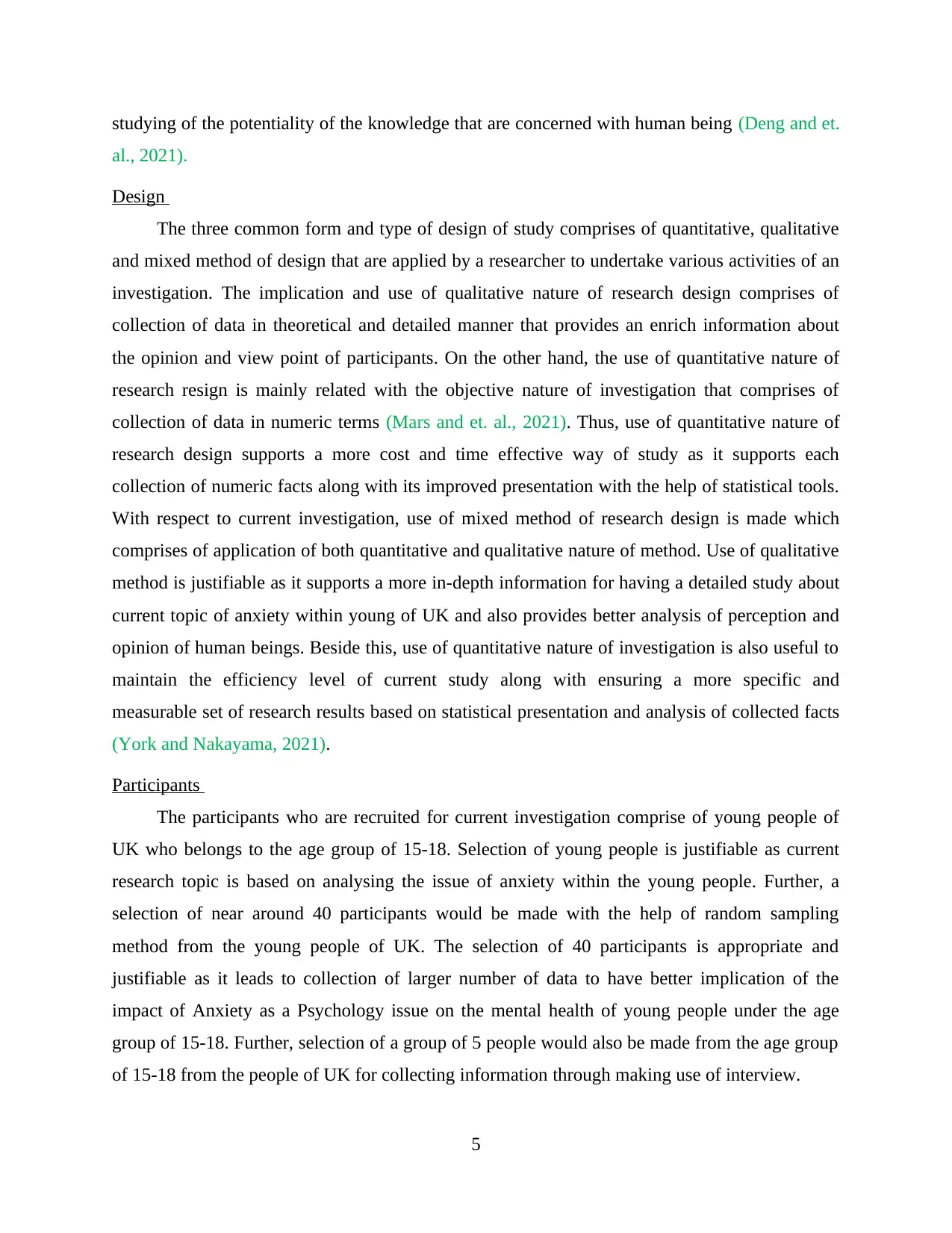
studying of the potentiality of the knowledge that are concerned with human being (Deng and et.
al., 2021).
Design
The three common form and type of design of study comprises of quantitative, qualitative
and mixed method of design that are applied by a researcher to undertake various activities of an
investigation. The implication and use of qualitative nature of research design comprises of
collection of data in theoretical and detailed manner that provides an enrich information about
the opinion and view point of participants. On the other hand, the use of quantitative nature of
research resign is mainly related with the objective nature of investigation that comprises of
collection of data in numeric terms (Mars and et. al., 2021). Thus, use of quantitative nature of
research design supports a more cost and time effective way of study as it supports each
collection of numeric facts along with its improved presentation with the help of statistical tools.
With respect to current investigation, use of mixed method of research design is made which
comprises of application of both quantitative and qualitative nature of method. Use of qualitative
method is justifiable as it supports a more in-depth information for having a detailed study about
current topic of anxiety within young of UK and also provides better analysis of perception and
opinion of human beings. Beside this, use of quantitative nature of investigation is also useful to
maintain the efficiency level of current study along with ensuring a more specific and
measurable set of research results based on statistical presentation and analysis of collected facts
(York and Nakayama, 2021).
Participants
The participants who are recruited for current investigation comprise of young people of
UK who belongs to the age group of 15-18. Selection of young people is justifiable as current
research topic is based on analysing the issue of anxiety within the young people. Further, a
selection of near around 40 participants would be made with the help of random sampling
method from the young people of UK. The selection of 40 participants is appropriate and
justifiable as it leads to collection of larger number of data to have better implication of the
impact of Anxiety as a Psychology issue on the mental health of young people under the age
group of 15-18. Further, selection of a group of 5 people would also be made from the age group
of 15-18 from the people of UK for collecting information through making use of interview.
5
al., 2021).
Design
The three common form and type of design of study comprises of quantitative, qualitative
and mixed method of design that are applied by a researcher to undertake various activities of an
investigation. The implication and use of qualitative nature of research design comprises of
collection of data in theoretical and detailed manner that provides an enrich information about
the opinion and view point of participants. On the other hand, the use of quantitative nature of
research resign is mainly related with the objective nature of investigation that comprises of
collection of data in numeric terms (Mars and et. al., 2021). Thus, use of quantitative nature of
research design supports a more cost and time effective way of study as it supports each
collection of numeric facts along with its improved presentation with the help of statistical tools.
With respect to current investigation, use of mixed method of research design is made which
comprises of application of both quantitative and qualitative nature of method. Use of qualitative
method is justifiable as it supports a more in-depth information for having a detailed study about
current topic of anxiety within young of UK and also provides better analysis of perception and
opinion of human beings. Beside this, use of quantitative nature of investigation is also useful to
maintain the efficiency level of current study along with ensuring a more specific and
measurable set of research results based on statistical presentation and analysis of collected facts
(York and Nakayama, 2021).
Participants
The participants who are recruited for current investigation comprise of young people of
UK who belongs to the age group of 15-18. Selection of young people is justifiable as current
research topic is based on analysing the issue of anxiety within the young people. Further, a
selection of near around 40 participants would be made with the help of random sampling
method from the young people of UK. The selection of 40 participants is appropriate and
justifiable as it leads to collection of larger number of data to have better implication of the
impact of Anxiety as a Psychology issue on the mental health of young people under the age
group of 15-18. Further, selection of a group of 5 people would also be made from the age group
of 15-18 from the people of UK for collecting information through making use of interview.
5
Paraphrase This Document
Need a fresh take? Get an instant paraphrase of this document with our AI Paraphraser
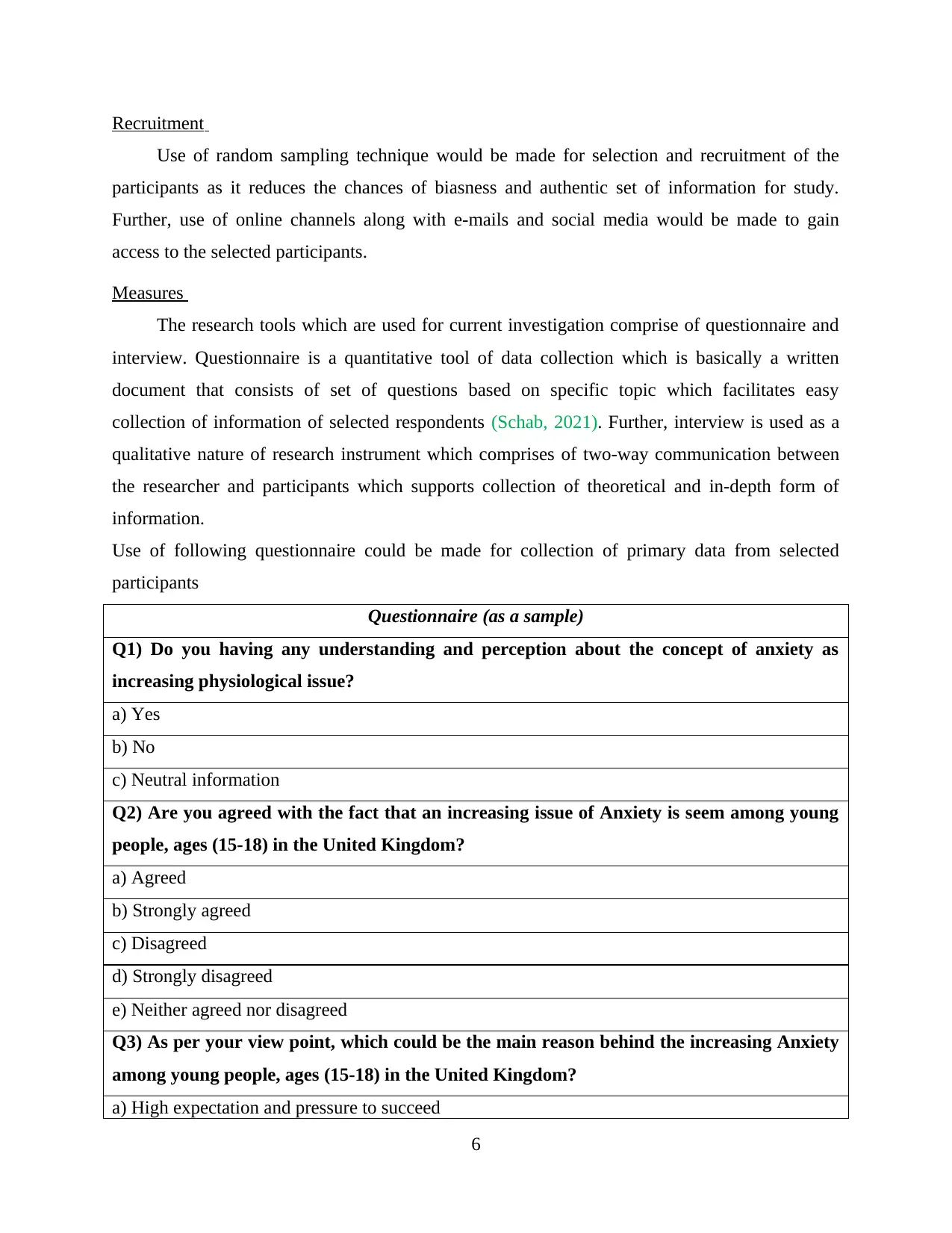
Recruitment
Use of random sampling technique would be made for selection and recruitment of the
participants as it reduces the chances of biasness and authentic set of information for study.
Further, use of online channels along with e-mails and social media would be made to gain
access to the selected participants.
Measures
The research tools which are used for current investigation comprise of questionnaire and
interview. Questionnaire is a quantitative tool of data collection which is basically a written
document that consists of set of questions based on specific topic which facilitates easy
collection of information of selected respondents (Schab, 2021). Further, interview is used as a
qualitative nature of research instrument which comprises of two-way communication between
the researcher and participants which supports collection of theoretical and in-depth form of
information.
Use of following questionnaire could be made for collection of primary data from selected
participants
Questionnaire (as a sample)
Q1) Do you having any understanding and perception about the concept of anxiety as
increasing physiological issue?
a) Yes
b) No
c) Neutral information
Q2) Are you agreed with the fact that an increasing issue of Anxiety is seem among young
people, ages (15-18) in the United Kingdom?
a) Agreed
b) Strongly agreed
c) Disagreed
d) Strongly disagreed
e) Neither agreed nor disagreed
Q3) As per your view point, which could be the main reason behind the increasing Anxiety
among young people, ages (15-18) in the United Kingdom?
a) High expectation and pressure to succeed
6
Use of random sampling technique would be made for selection and recruitment of the
participants as it reduces the chances of biasness and authentic set of information for study.
Further, use of online channels along with e-mails and social media would be made to gain
access to the selected participants.
Measures
The research tools which are used for current investigation comprise of questionnaire and
interview. Questionnaire is a quantitative tool of data collection which is basically a written
document that consists of set of questions based on specific topic which facilitates easy
collection of information of selected respondents (Schab, 2021). Further, interview is used as a
qualitative nature of research instrument which comprises of two-way communication between
the researcher and participants which supports collection of theoretical and in-depth form of
information.
Use of following questionnaire could be made for collection of primary data from selected
participants
Questionnaire (as a sample)
Q1) Do you having any understanding and perception about the concept of anxiety as
increasing physiological issue?
a) Yes
b) No
c) Neutral information
Q2) Are you agreed with the fact that an increasing issue of Anxiety is seem among young
people, ages (15-18) in the United Kingdom?
a) Agreed
b) Strongly agreed
c) Disagreed
d) Strongly disagreed
e) Neither agreed nor disagreed
Q3) As per your view point, which could be the main reason behind the increasing Anxiety
among young people, ages (15-18) in the United Kingdom?
a) High expectation and pressure to succeed
6
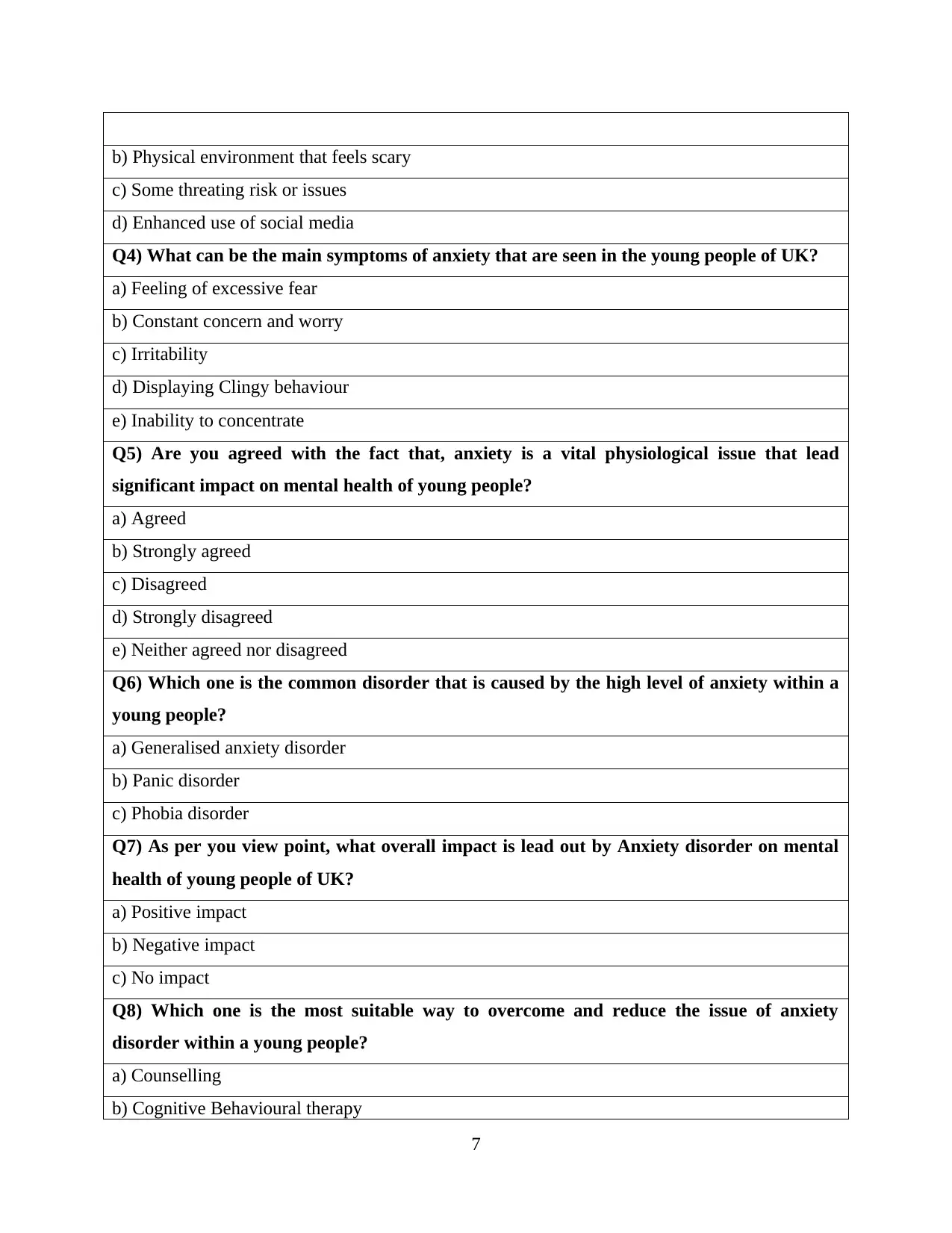
b) Physical environment that feels scary
c) Some threating risk or issues
d) Enhanced use of social media
Q4) What can be the main symptoms of anxiety that are seen in the young people of UK?
a) Feeling of excessive fear
b) Constant concern and worry
c) Irritability
d) Displaying Clingy behaviour
e) Inability to concentrate
Q5) Are you agreed with the fact that, anxiety is a vital physiological issue that lead
significant impact on mental health of young people?
a) Agreed
b) Strongly agreed
c) Disagreed
d) Strongly disagreed
e) Neither agreed nor disagreed
Q6) Which one is the common disorder that is caused by the high level of anxiety within a
young people?
a) Generalised anxiety disorder
b) Panic disorder
c) Phobia disorder
Q7) As per you view point, what overall impact is lead out by Anxiety disorder on mental
health of young people of UK?
a) Positive impact
b) Negative impact
c) No impact
Q8) Which one is the most suitable way to overcome and reduce the issue of anxiety
disorder within a young people?
a) Counselling
b) Cognitive Behavioural therapy
7
c) Some threating risk or issues
d) Enhanced use of social media
Q4) What can be the main symptoms of anxiety that are seen in the young people of UK?
a) Feeling of excessive fear
b) Constant concern and worry
c) Irritability
d) Displaying Clingy behaviour
e) Inability to concentrate
Q5) Are you agreed with the fact that, anxiety is a vital physiological issue that lead
significant impact on mental health of young people?
a) Agreed
b) Strongly agreed
c) Disagreed
d) Strongly disagreed
e) Neither agreed nor disagreed
Q6) Which one is the common disorder that is caused by the high level of anxiety within a
young people?
a) Generalised anxiety disorder
b) Panic disorder
c) Phobia disorder
Q7) As per you view point, what overall impact is lead out by Anxiety disorder on mental
health of young people of UK?
a) Positive impact
b) Negative impact
c) No impact
Q8) Which one is the most suitable way to overcome and reduce the issue of anxiety
disorder within a young people?
a) Counselling
b) Cognitive Behavioural therapy
7
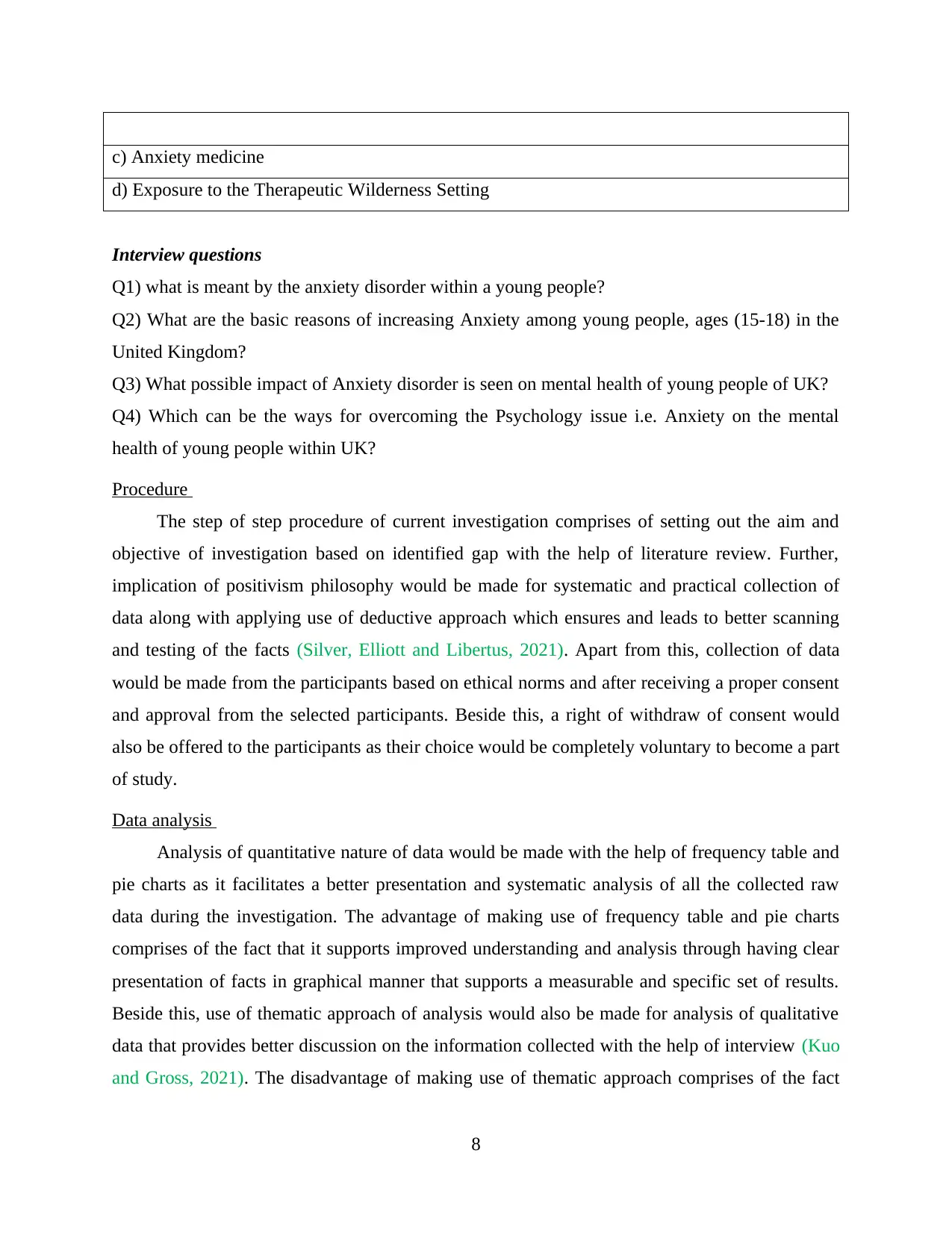
c) Anxiety medicine
d) Exposure to the Therapeutic Wilderness Setting
Interview questions
Q1) what is meant by the anxiety disorder within a young people?
Q2) What are the basic reasons of increasing Anxiety among young people, ages (15-18) in the
United Kingdom?
Q3) What possible impact of Anxiety disorder is seen on mental health of young people of UK?
Q4) Which can be the ways for overcoming the Psychology issue i.e. Anxiety on the mental
health of young people within UK?
Procedure
The step of step procedure of current investigation comprises of setting out the aim and
objective of investigation based on identified gap with the help of literature review. Further,
implication of positivism philosophy would be made for systematic and practical collection of
data along with applying use of deductive approach which ensures and leads to better scanning
and testing of the facts (Silver, Elliott and Libertus, 2021). Apart from this, collection of data
would be made from the participants based on ethical norms and after receiving a proper consent
and approval from the selected participants. Beside this, a right of withdraw of consent would
also be offered to the participants as their choice would be completely voluntary to become a part
of study.
Data analysis
Analysis of quantitative nature of data would be made with the help of frequency table and
pie charts as it facilitates a better presentation and systematic analysis of all the collected raw
data during the investigation. The advantage of making use of frequency table and pie charts
comprises of the fact that it supports improved understanding and analysis through having clear
presentation of facts in graphical manner that supports a measurable and specific set of results.
Beside this, use of thematic approach of analysis would also be made for analysis of qualitative
data that provides better discussion on the information collected with the help of interview (Kuo
and Gross, 2021). The disadvantage of making use of thematic approach comprises of the fact
8
d) Exposure to the Therapeutic Wilderness Setting
Interview questions
Q1) what is meant by the anxiety disorder within a young people?
Q2) What are the basic reasons of increasing Anxiety among young people, ages (15-18) in the
United Kingdom?
Q3) What possible impact of Anxiety disorder is seen on mental health of young people of UK?
Q4) Which can be the ways for overcoming the Psychology issue i.e. Anxiety on the mental
health of young people within UK?
Procedure
The step of step procedure of current investigation comprises of setting out the aim and
objective of investigation based on identified gap with the help of literature review. Further,
implication of positivism philosophy would be made for systematic and practical collection of
data along with applying use of deductive approach which ensures and leads to better scanning
and testing of the facts (Silver, Elliott and Libertus, 2021). Apart from this, collection of data
would be made from the participants based on ethical norms and after receiving a proper consent
and approval from the selected participants. Beside this, a right of withdraw of consent would
also be offered to the participants as their choice would be completely voluntary to become a part
of study.
Data analysis
Analysis of quantitative nature of data would be made with the help of frequency table and
pie charts as it facilitates a better presentation and systematic analysis of all the collected raw
data during the investigation. The advantage of making use of frequency table and pie charts
comprises of the fact that it supports improved understanding and analysis through having clear
presentation of facts in graphical manner that supports a measurable and specific set of results.
Beside this, use of thematic approach of analysis would also be made for analysis of qualitative
data that provides better discussion on the information collected with the help of interview (Kuo
and Gross, 2021). The disadvantage of making use of thematic approach comprises of the fact
8
Secure Best Marks with AI Grader
Need help grading? Try our AI Grader for instant feedback on your assignments.
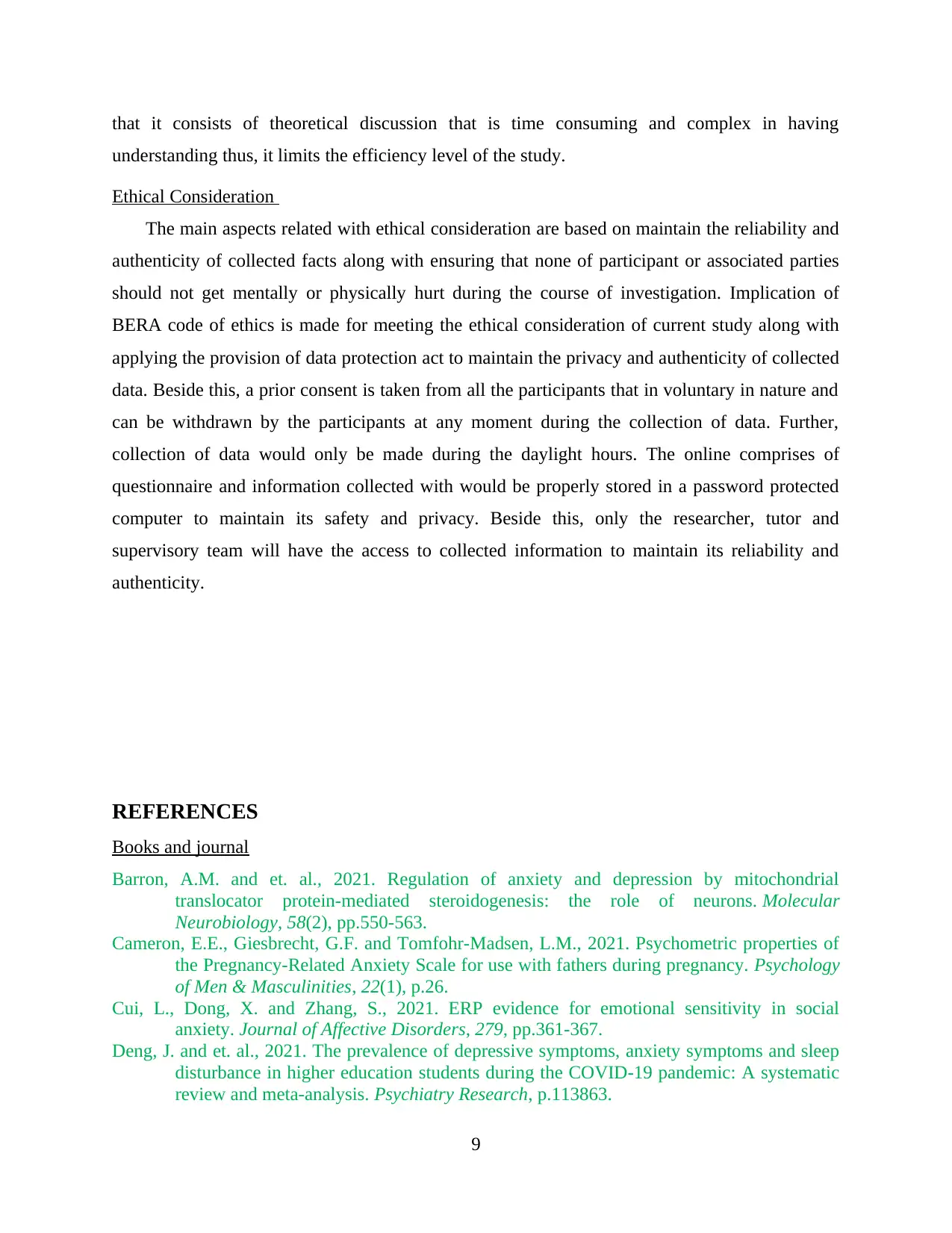
that it consists of theoretical discussion that is time consuming and complex in having
understanding thus, it limits the efficiency level of the study.
Ethical Consideration
The main aspects related with ethical consideration are based on maintain the reliability and
authenticity of collected facts along with ensuring that none of participant or associated parties
should not get mentally or physically hurt during the course of investigation. Implication of
BERA code of ethics is made for meeting the ethical consideration of current study along with
applying the provision of data protection act to maintain the privacy and authenticity of collected
data. Beside this, a prior consent is taken from all the participants that in voluntary in nature and
can be withdrawn by the participants at any moment during the collection of data. Further,
collection of data would only be made during the daylight hours. The online comprises of
questionnaire and information collected with would be properly stored in a password protected
computer to maintain its safety and privacy. Beside this, only the researcher, tutor and
supervisory team will have the access to collected information to maintain its reliability and
authenticity.
REFERENCES
Books and journal
Barron, A.M. and et. al., 2021. Regulation of anxiety and depression by mitochondrial
translocator protein-mediated steroidogenesis: the role of neurons. Molecular
Neurobiology, 58(2), pp.550-563.
Cameron, E.E., Giesbrecht, G.F. and Tomfohr-Madsen, L.M., 2021. Psychometric properties of
the Pregnancy-Related Anxiety Scale for use with fathers during pregnancy. Psychology
of Men & Masculinities, 22(1), p.26.
Cui, L., Dong, X. and Zhang, S., 2021. ERP evidence for emotional sensitivity in social
anxiety. Journal of Affective Disorders, 279, pp.361-367.
Deng, J. and et. al., 2021. The prevalence of depressive symptoms, anxiety symptoms and sleep
disturbance in higher education students during the COVID-19 pandemic: A systematic
review and meta-analysis. Psychiatry Research, p.113863.
9
understanding thus, it limits the efficiency level of the study.
Ethical Consideration
The main aspects related with ethical consideration are based on maintain the reliability and
authenticity of collected facts along with ensuring that none of participant or associated parties
should not get mentally or physically hurt during the course of investigation. Implication of
BERA code of ethics is made for meeting the ethical consideration of current study along with
applying the provision of data protection act to maintain the privacy and authenticity of collected
data. Beside this, a prior consent is taken from all the participants that in voluntary in nature and
can be withdrawn by the participants at any moment during the collection of data. Further,
collection of data would only be made during the daylight hours. The online comprises of
questionnaire and information collected with would be properly stored in a password protected
computer to maintain its safety and privacy. Beside this, only the researcher, tutor and
supervisory team will have the access to collected information to maintain its reliability and
authenticity.
REFERENCES
Books and journal
Barron, A.M. and et. al., 2021. Regulation of anxiety and depression by mitochondrial
translocator protein-mediated steroidogenesis: the role of neurons. Molecular
Neurobiology, 58(2), pp.550-563.
Cameron, E.E., Giesbrecht, G.F. and Tomfohr-Madsen, L.M., 2021. Psychometric properties of
the Pregnancy-Related Anxiety Scale for use with fathers during pregnancy. Psychology
of Men & Masculinities, 22(1), p.26.
Cui, L., Dong, X. and Zhang, S., 2021. ERP evidence for emotional sensitivity in social
anxiety. Journal of Affective Disorders, 279, pp.361-367.
Deng, J. and et. al., 2021. The prevalence of depressive symptoms, anxiety symptoms and sleep
disturbance in higher education students during the COVID-19 pandemic: A systematic
review and meta-analysis. Psychiatry Research, p.113863.
9
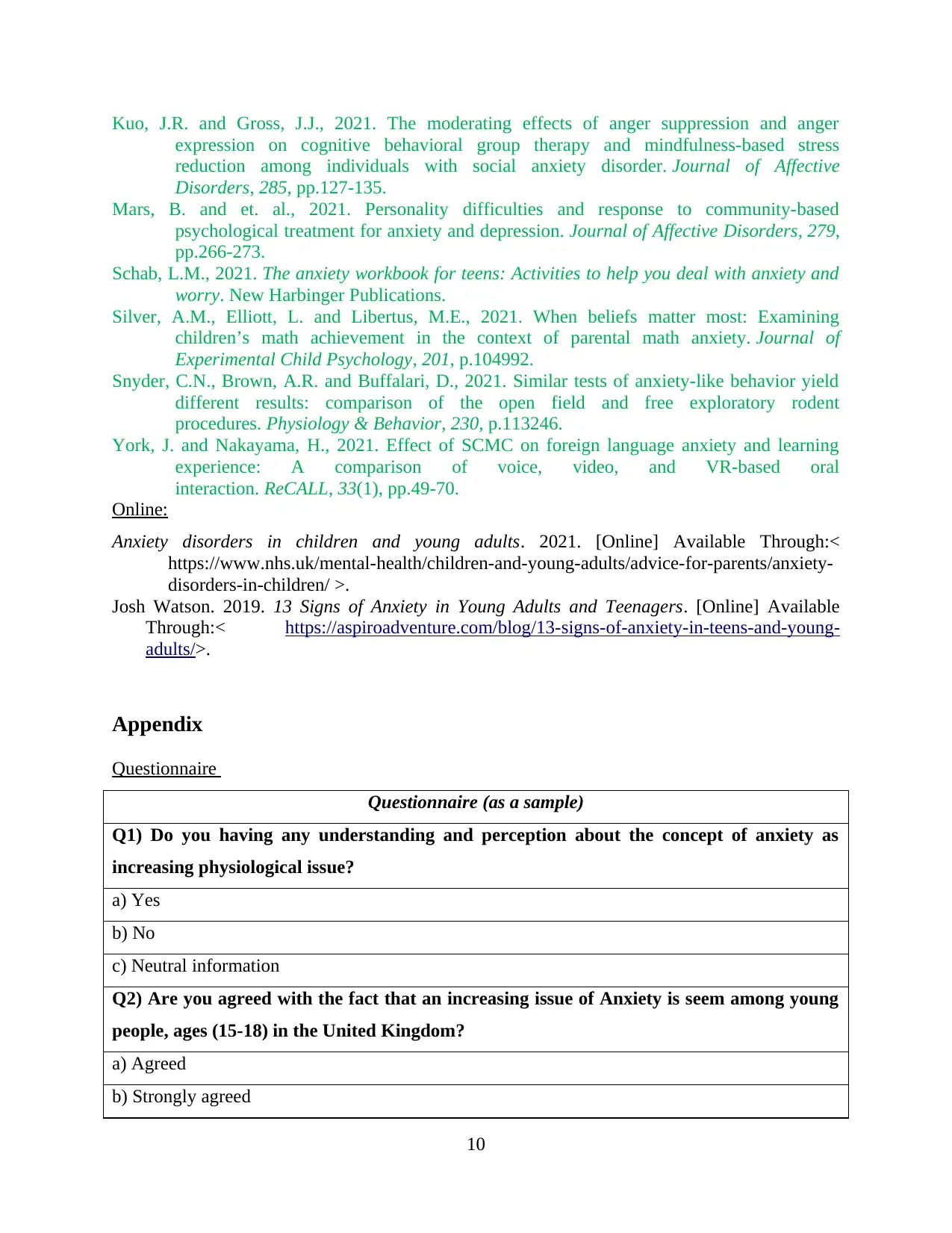
Kuo, J.R. and Gross, J.J., 2021. The moderating effects of anger suppression and anger
expression on cognitive behavioral group therapy and mindfulness-based stress
reduction among individuals with social anxiety disorder. Journal of Affective
Disorders, 285, pp.127-135.
Mars, B. and et. al., 2021. Personality difficulties and response to community-based
psychological treatment for anxiety and depression. Journal of Affective Disorders, 279,
pp.266-273.
Schab, L.M., 2021. The anxiety workbook for teens: Activities to help you deal with anxiety and
worry. New Harbinger Publications.
Silver, A.M., Elliott, L. and Libertus, M.E., 2021. When beliefs matter most: Examining
children’s math achievement in the context of parental math anxiety. Journal of
Experimental Child Psychology, 201, p.104992.
Snyder, C.N., Brown, A.R. and Buffalari, D., 2021. Similar tests of anxiety-like behavior yield
different results: comparison of the open field and free exploratory rodent
procedures. Physiology & Behavior, 230, p.113246.
York, J. and Nakayama, H., 2021. Effect of SCMC on foreign language anxiety and learning
experience: A comparison of voice, video, and VR-based oral
interaction. ReCALL, 33(1), pp.49-70.
Online:
Anxiety disorders in children and young adults. 2021. [Online] Available Through:<
https://www.nhs.uk/mental-health/children-and-young-adults/advice-for-parents/anxiety-
disorders-in-children/ >.
Josh Watson. 2019. 13 Signs of Anxiety in Young Adults and Teenagers. [Online] Available
Through:< https://aspiroadventure.com/blog/13-signs-of-anxiety-in-teens-and-young-
adults/>.
Appendix
Questionnaire
Questionnaire (as a sample)
Q1) Do you having any understanding and perception about the concept of anxiety as
increasing physiological issue?
a) Yes
b) No
c) Neutral information
Q2) Are you agreed with the fact that an increasing issue of Anxiety is seem among young
people, ages (15-18) in the United Kingdom?
a) Agreed
b) Strongly agreed
10
expression on cognitive behavioral group therapy and mindfulness-based stress
reduction among individuals with social anxiety disorder. Journal of Affective
Disorders, 285, pp.127-135.
Mars, B. and et. al., 2021. Personality difficulties and response to community-based
psychological treatment for anxiety and depression. Journal of Affective Disorders, 279,
pp.266-273.
Schab, L.M., 2021. The anxiety workbook for teens: Activities to help you deal with anxiety and
worry. New Harbinger Publications.
Silver, A.M., Elliott, L. and Libertus, M.E., 2021. When beliefs matter most: Examining
children’s math achievement in the context of parental math anxiety. Journal of
Experimental Child Psychology, 201, p.104992.
Snyder, C.N., Brown, A.R. and Buffalari, D., 2021. Similar tests of anxiety-like behavior yield
different results: comparison of the open field and free exploratory rodent
procedures. Physiology & Behavior, 230, p.113246.
York, J. and Nakayama, H., 2021. Effect of SCMC on foreign language anxiety and learning
experience: A comparison of voice, video, and VR-based oral
interaction. ReCALL, 33(1), pp.49-70.
Online:
Anxiety disorders in children and young adults. 2021. [Online] Available Through:<
https://www.nhs.uk/mental-health/children-and-young-adults/advice-for-parents/anxiety-
disorders-in-children/ >.
Josh Watson. 2019. 13 Signs of Anxiety in Young Adults and Teenagers. [Online] Available
Through:< https://aspiroadventure.com/blog/13-signs-of-anxiety-in-teens-and-young-
adults/>.
Appendix
Questionnaire
Questionnaire (as a sample)
Q1) Do you having any understanding and perception about the concept of anxiety as
increasing physiological issue?
a) Yes
b) No
c) Neutral information
Q2) Are you agreed with the fact that an increasing issue of Anxiety is seem among young
people, ages (15-18) in the United Kingdom?
a) Agreed
b) Strongly agreed
10
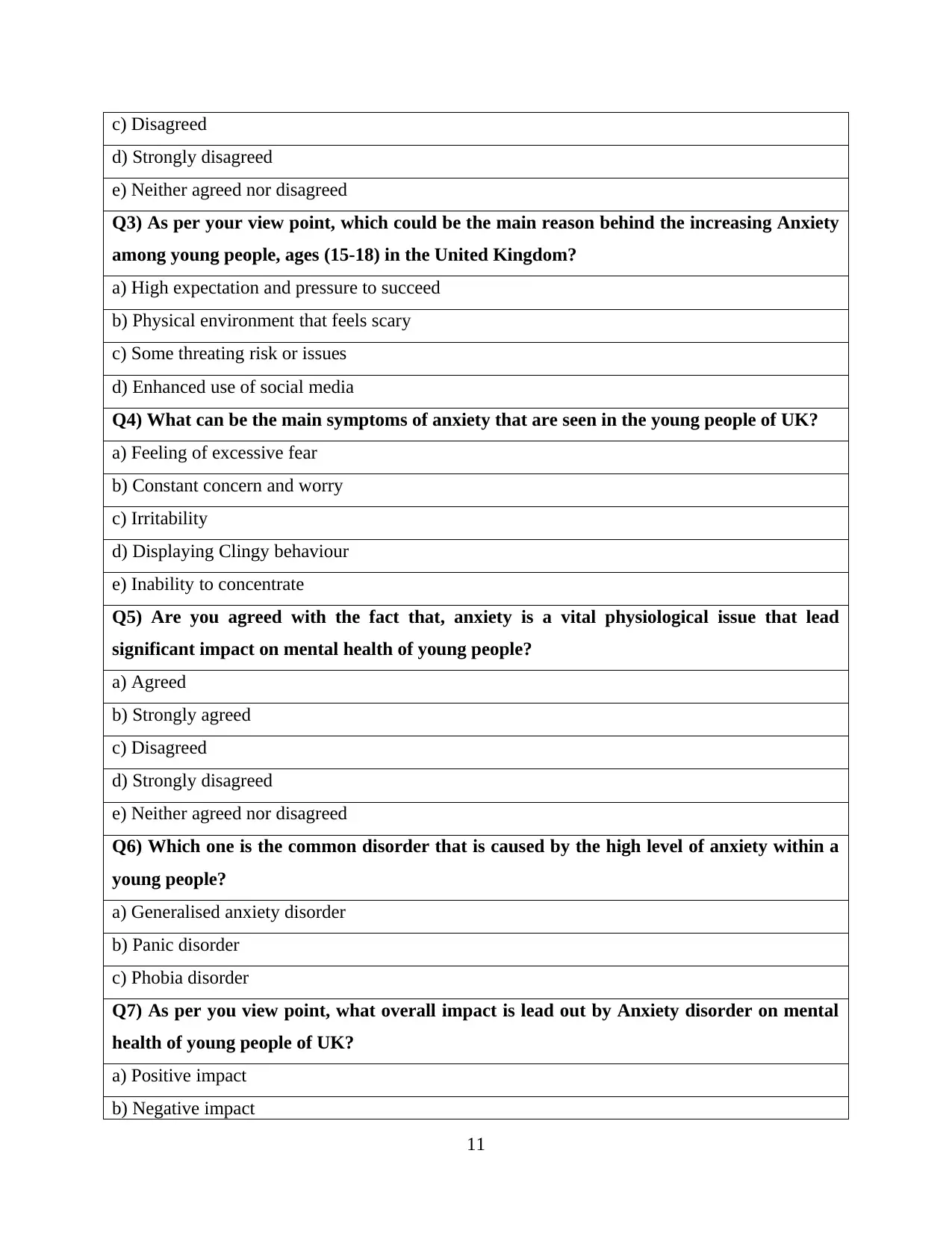
c) Disagreed
d) Strongly disagreed
e) Neither agreed nor disagreed
Q3) As per your view point, which could be the main reason behind the increasing Anxiety
among young people, ages (15-18) in the United Kingdom?
a) High expectation and pressure to succeed
b) Physical environment that feels scary
c) Some threating risk or issues
d) Enhanced use of social media
Q4) What can be the main symptoms of anxiety that are seen in the young people of UK?
a) Feeling of excessive fear
b) Constant concern and worry
c) Irritability
d) Displaying Clingy behaviour
e) Inability to concentrate
Q5) Are you agreed with the fact that, anxiety is a vital physiological issue that lead
significant impact on mental health of young people?
a) Agreed
b) Strongly agreed
c) Disagreed
d) Strongly disagreed
e) Neither agreed nor disagreed
Q6) Which one is the common disorder that is caused by the high level of anxiety within a
young people?
a) Generalised anxiety disorder
b) Panic disorder
c) Phobia disorder
Q7) As per you view point, what overall impact is lead out by Anxiety disorder on mental
health of young people of UK?
a) Positive impact
b) Negative impact
11
d) Strongly disagreed
e) Neither agreed nor disagreed
Q3) As per your view point, which could be the main reason behind the increasing Anxiety
among young people, ages (15-18) in the United Kingdom?
a) High expectation and pressure to succeed
b) Physical environment that feels scary
c) Some threating risk or issues
d) Enhanced use of social media
Q4) What can be the main symptoms of anxiety that are seen in the young people of UK?
a) Feeling of excessive fear
b) Constant concern and worry
c) Irritability
d) Displaying Clingy behaviour
e) Inability to concentrate
Q5) Are you agreed with the fact that, anxiety is a vital physiological issue that lead
significant impact on mental health of young people?
a) Agreed
b) Strongly agreed
c) Disagreed
d) Strongly disagreed
e) Neither agreed nor disagreed
Q6) Which one is the common disorder that is caused by the high level of anxiety within a
young people?
a) Generalised anxiety disorder
b) Panic disorder
c) Phobia disorder
Q7) As per you view point, what overall impact is lead out by Anxiety disorder on mental
health of young people of UK?
a) Positive impact
b) Negative impact
11
Paraphrase This Document
Need a fresh take? Get an instant paraphrase of this document with our AI Paraphraser
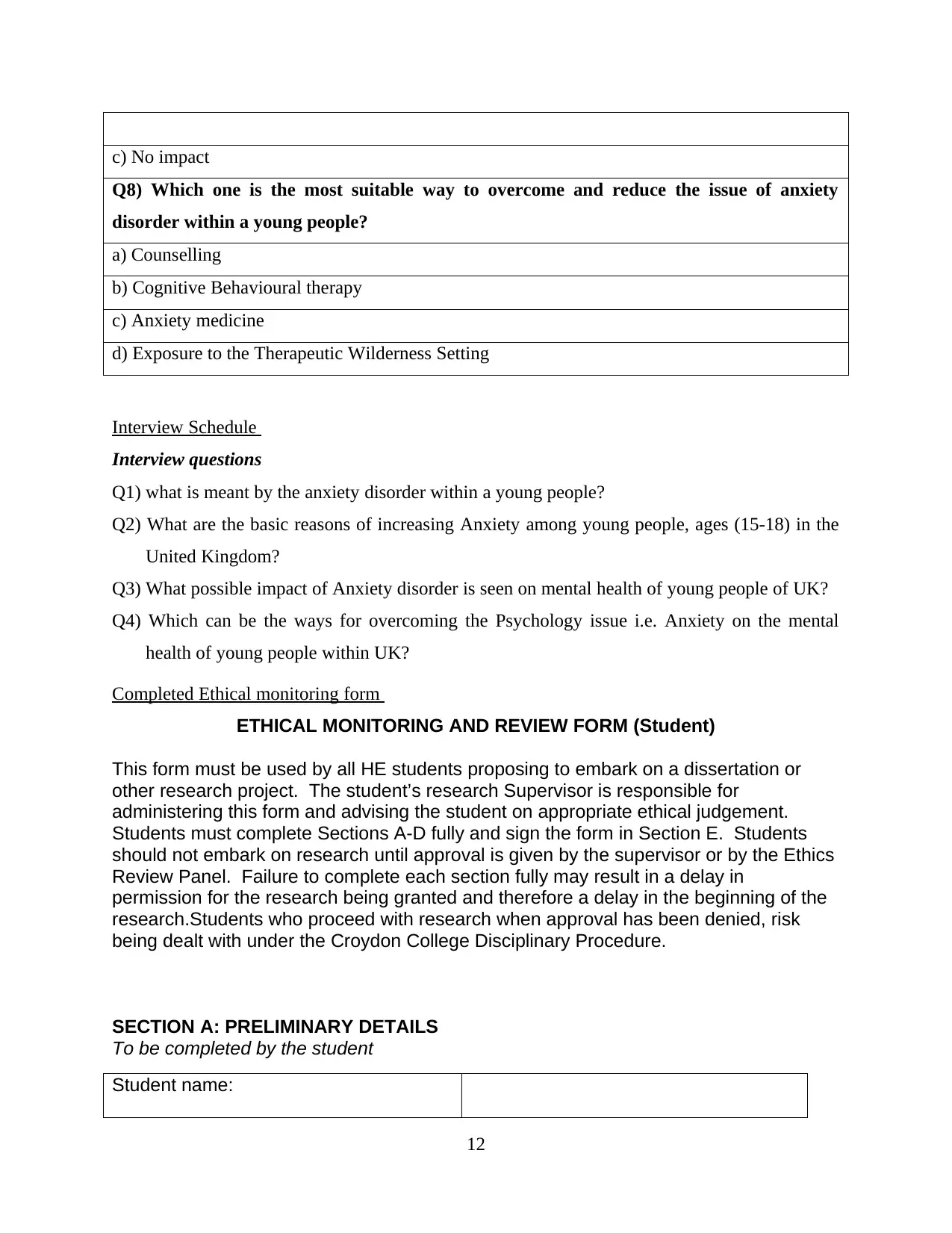
c) No impact
Q8) Which one is the most suitable way to overcome and reduce the issue of anxiety
disorder within a young people?
a) Counselling
b) Cognitive Behavioural therapy
c) Anxiety medicine
d) Exposure to the Therapeutic Wilderness Setting
Interview Schedule
Interview questions
Q1) what is meant by the anxiety disorder within a young people?
Q2) What are the basic reasons of increasing Anxiety among young people, ages (15-18) in the
United Kingdom?
Q3) What possible impact of Anxiety disorder is seen on mental health of young people of UK?
Q4) Which can be the ways for overcoming the Psychology issue i.e. Anxiety on the mental
health of young people within UK?
Completed Ethical monitoring form
ETHICAL MONITORING AND REVIEW FORM (Student)
This form must be used by all HE students proposing to embark on a dissertation or
other research project. The student’s research Supervisor is responsible for
administering this form and advising the student on appropriate ethical judgement.
Students must complete Sections A-D fully and sign the form in Section E. Students
should not embark on research until approval is given by the supervisor or by the Ethics
Review Panel. Failure to complete each section fully may result in a delay in
permission for the research being granted and therefore a delay in the beginning of the
research.Students who proceed with research when approval has been denied, risk
being dealt with under the Croydon College Disciplinary Procedure.
SECTION A: PRELIMINARY DETAILS
To be completed by the student
Student name:
12
Q8) Which one is the most suitable way to overcome and reduce the issue of anxiety
disorder within a young people?
a) Counselling
b) Cognitive Behavioural therapy
c) Anxiety medicine
d) Exposure to the Therapeutic Wilderness Setting
Interview Schedule
Interview questions
Q1) what is meant by the anxiety disorder within a young people?
Q2) What are the basic reasons of increasing Anxiety among young people, ages (15-18) in the
United Kingdom?
Q3) What possible impact of Anxiety disorder is seen on mental health of young people of UK?
Q4) Which can be the ways for overcoming the Psychology issue i.e. Anxiety on the mental
health of young people within UK?
Completed Ethical monitoring form
ETHICAL MONITORING AND REVIEW FORM (Student)
This form must be used by all HE students proposing to embark on a dissertation or
other research project. The student’s research Supervisor is responsible for
administering this form and advising the student on appropriate ethical judgement.
Students must complete Sections A-D fully and sign the form in Section E. Students
should not embark on research until approval is given by the supervisor or by the Ethics
Review Panel. Failure to complete each section fully may result in a delay in
permission for the research being granted and therefore a delay in the beginning of the
research.Students who proceed with research when approval has been denied, risk
being dealt with under the Croydon College Disciplinary Procedure.
SECTION A: PRELIMINARY DETAILS
To be completed by the student
Student name:
12
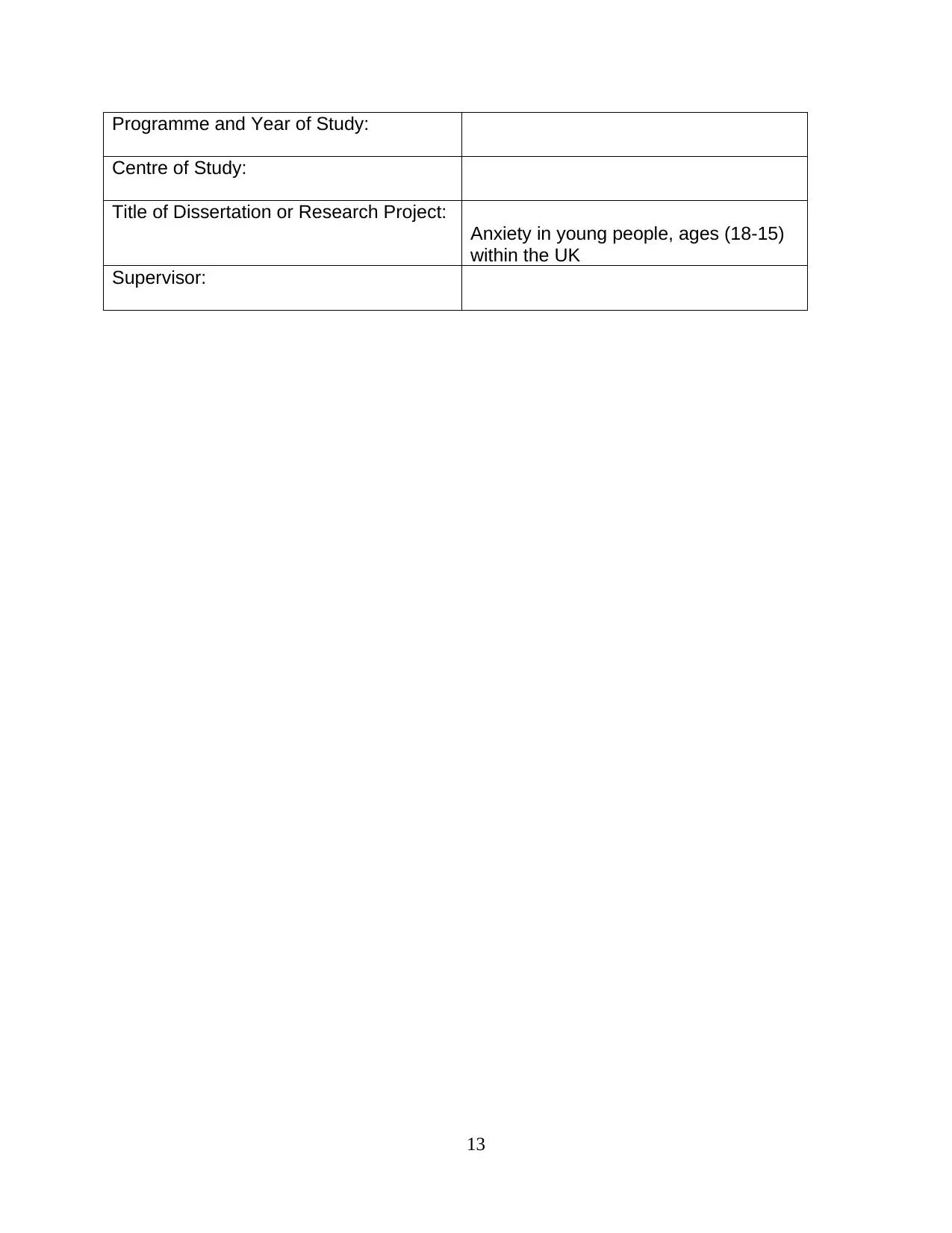
Programme and Year of Study:
Centre of Study:
Title of Dissertation or Research Project:
Anxiety in young people, ages (18-15)
within the UK
Supervisor:
13
Centre of Study:
Title of Dissertation or Research Project:
Anxiety in young people, ages (18-15)
within the UK
Supervisor:
13
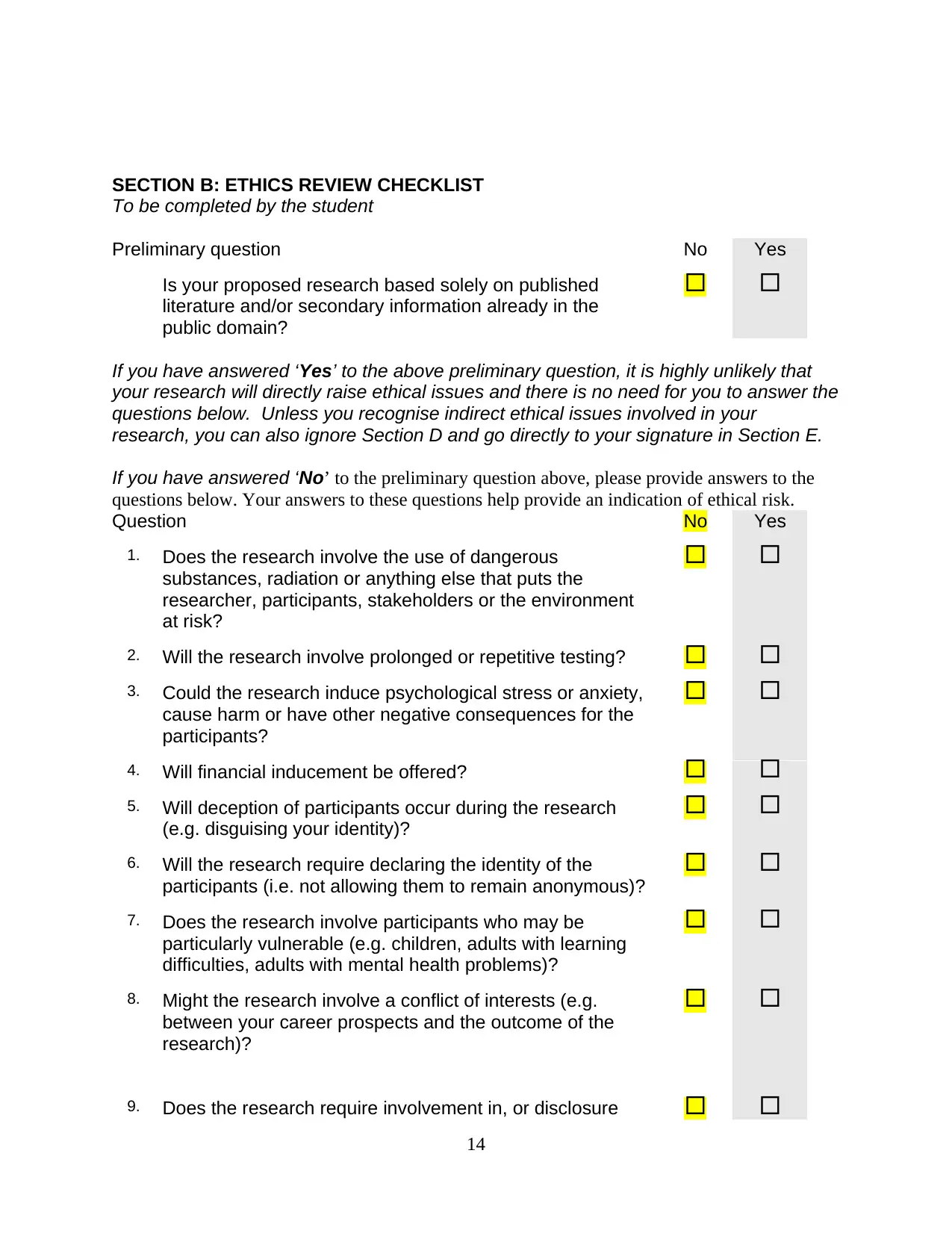
SECTION B: ETHICS REVIEW CHECKLIST
To be completed by the student
Preliminary question No Yes
Is your proposed research based solely on published
literature and/or secondary information already in the
public domain?
If you have answered ‘Yes’ to the above preliminary question, it is highly unlikely that
your research will directly raise ethical issues and there is no need for you to answer the
questions below. Unless you recognise indirect ethical issues involved in your
research, you can also ignore Section D and go directly to your signature in Section E.
If you have answered ‘No’ to the preliminary question above, please provide answers to the
questions below. Your answers to these questions help provide an indication of ethical risk.
Question No Yes
1. Does the research involve the use of dangerous
substances, radiation or anything else that puts the
researcher, participants, stakeholders or the environment
at risk?
2. Will the research involve prolonged or repetitive testing?
3. Could the research induce psychological stress or anxiety,
cause harm or have other negative consequences for the
participants?
4. Will financial inducement be offered?
5. Will deception of participants occur during the research
(e.g. disguising your identity)?
6. Will the research require declaring the identity of the
participants (i.e. not allowing them to remain anonymous)?
7. Does the research involve participants who may be
particularly vulnerable (e.g. children, adults with learning
difficulties, adults with mental health problems)?
8. Might the research involve a conflict of interests (e.g.
between your career prospects and the outcome of the
research)?
9. Does the research require involvement in, or disclosure
14
To be completed by the student
Preliminary question No Yes
Is your proposed research based solely on published
literature and/or secondary information already in the
public domain?
If you have answered ‘Yes’ to the above preliminary question, it is highly unlikely that
your research will directly raise ethical issues and there is no need for you to answer the
questions below. Unless you recognise indirect ethical issues involved in your
research, you can also ignore Section D and go directly to your signature in Section E.
If you have answered ‘No’ to the preliminary question above, please provide answers to the
questions below. Your answers to these questions help provide an indication of ethical risk.
Question No Yes
1. Does the research involve the use of dangerous
substances, radiation or anything else that puts the
researcher, participants, stakeholders or the environment
at risk?
2. Will the research involve prolonged or repetitive testing?
3. Could the research induce psychological stress or anxiety,
cause harm or have other negative consequences for the
participants?
4. Will financial inducement be offered?
5. Will deception of participants occur during the research
(e.g. disguising your identity)?
6. Will the research require declaring the identity of the
participants (i.e. not allowing them to remain anonymous)?
7. Does the research involve participants who may be
particularly vulnerable (e.g. children, adults with learning
difficulties, adults with mental health problems)?
8. Might the research involve a conflict of interests (e.g.
between your career prospects and the outcome of the
research)?
9. Does the research require involvement in, or disclosure
14
Secure Best Marks with AI Grader
Need help grading? Try our AI Grader for instant feedback on your assignments.
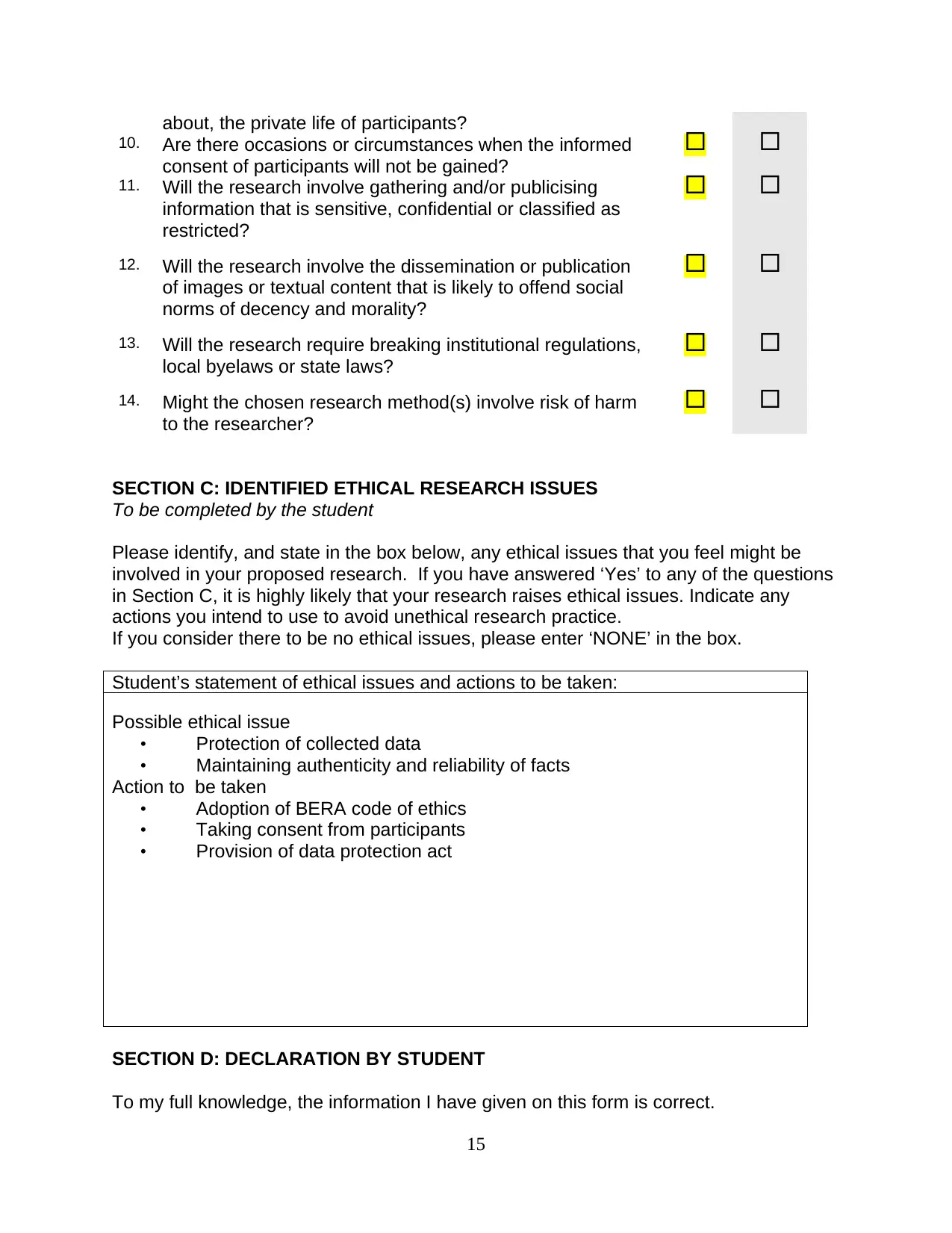
about, the private life of participants?
10. Are there occasions or circumstances when the informed
consent of participants will not be gained?
11. Will the research involve gathering and/or publicising
information that is sensitive, confidential or classified as
restricted?
12. Will the research involve the dissemination or publication
of images or textual content that is likely to offend social
norms of decency and morality?
13. Will the research require breaking institutional regulations,
local byelaws or state laws?
14. Might the chosen research method(s) involve risk of harm
to the researcher?
SECTION C: IDENTIFIED ETHICAL RESEARCH ISSUES
To be completed by the student
Please identify, and state in the box below, any ethical issues that you feel might be
involved in your proposed research. If you have answered ‘Yes’ to any of the questions
in Section C, it is highly likely that your research raises ethical issues. Indicate any
actions you intend to use to avoid unethical research practice.
If you consider there to be no ethical issues, please enter ‘NONE’ in the box.
Student’s statement of ethical issues and actions to be taken:
Possible ethical issue
• Protection of collected data
• Maintaining authenticity and reliability of facts
Action to be taken
• Adoption of BERA code of ethics
• Taking consent from participants
• Provision of data protection act
SECTION D: DECLARATION BY STUDENT
To my full knowledge, the information I have given on this form is correct.
15
10. Are there occasions or circumstances when the informed
consent of participants will not be gained?
11. Will the research involve gathering and/or publicising
information that is sensitive, confidential or classified as
restricted?
12. Will the research involve the dissemination or publication
of images or textual content that is likely to offend social
norms of decency and morality?
13. Will the research require breaking institutional regulations,
local byelaws or state laws?
14. Might the chosen research method(s) involve risk of harm
to the researcher?
SECTION C: IDENTIFIED ETHICAL RESEARCH ISSUES
To be completed by the student
Please identify, and state in the box below, any ethical issues that you feel might be
involved in your proposed research. If you have answered ‘Yes’ to any of the questions
in Section C, it is highly likely that your research raises ethical issues. Indicate any
actions you intend to use to avoid unethical research practice.
If you consider there to be no ethical issues, please enter ‘NONE’ in the box.
Student’s statement of ethical issues and actions to be taken:
Possible ethical issue
• Protection of collected data
• Maintaining authenticity and reliability of facts
Action to be taken
• Adoption of BERA code of ethics
• Taking consent from participants
• Provision of data protection act
SECTION D: DECLARATION BY STUDENT
To my full knowledge, the information I have given on this form is correct.
15

Signature: Date:
16
16
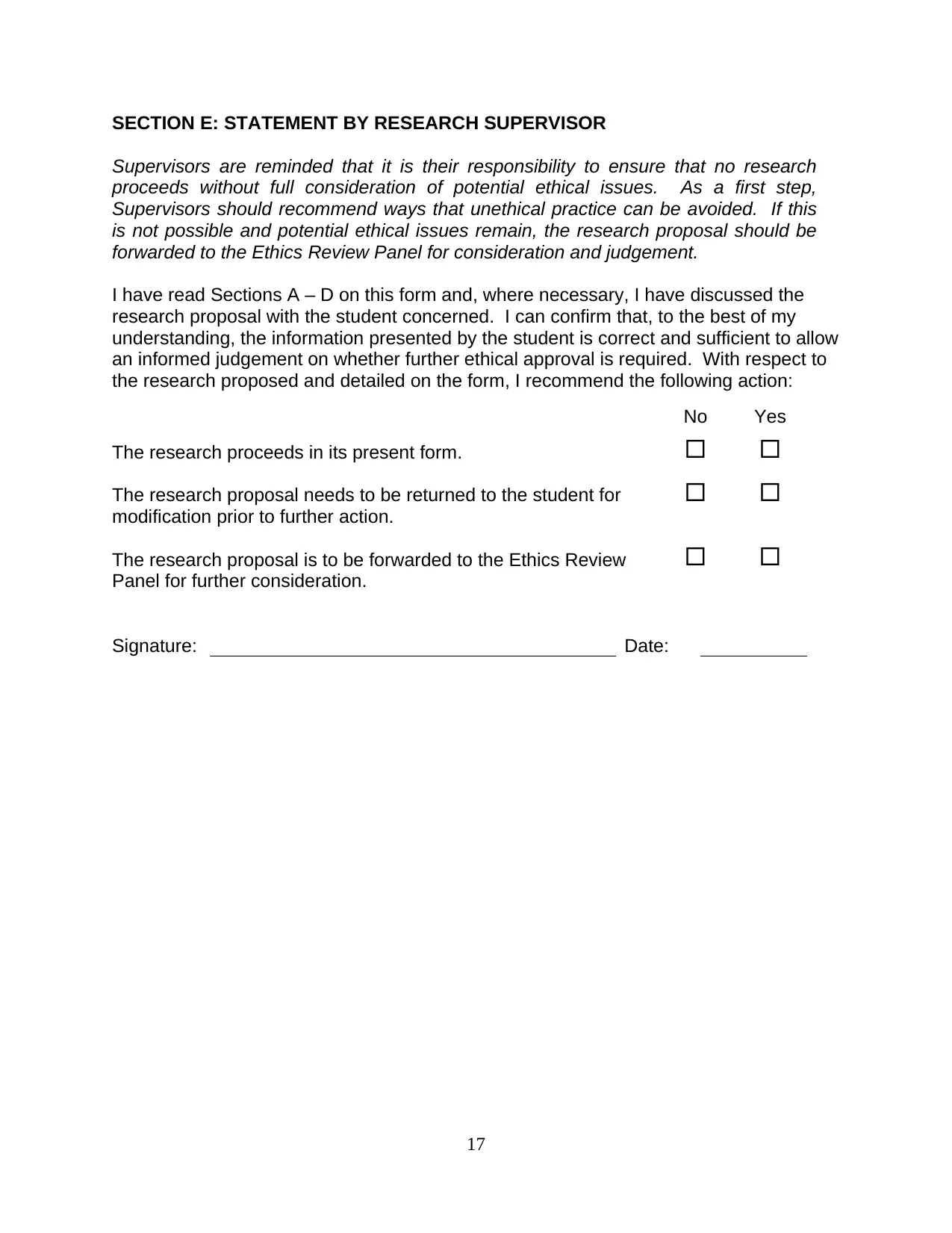
SECTION E: STATEMENT BY RESEARCH SUPERVISOR
Supervisors are reminded that it is their responsibility to ensure that no research
proceeds without full consideration of potential ethical issues. As a first step,
Supervisors should recommend ways that unethical practice can be avoided. If this
is not possible and potential ethical issues remain, the research proposal should be
forwarded to the Ethics Review Panel for consideration and judgement.
I have read Sections A – D on this form and, where necessary, I have discussed the
research proposal with the student concerned. I can confirm that, to the best of my
understanding, the information presented by the student is correct and sufficient to allow
an informed judgement on whether further ethical approval is required. With respect to
the research proposed and detailed on the form, I recommend the following action:
No Yes
The research proceeds in its present form.
The research proposal needs to be returned to the student for
modification prior to further action.
The research proposal is to be forwarded to the Ethics Review
Panel for further consideration.
Signature: Date:
17
Supervisors are reminded that it is their responsibility to ensure that no research
proceeds without full consideration of potential ethical issues. As a first step,
Supervisors should recommend ways that unethical practice can be avoided. If this
is not possible and potential ethical issues remain, the research proposal should be
forwarded to the Ethics Review Panel for consideration and judgement.
I have read Sections A – D on this form and, where necessary, I have discussed the
research proposal with the student concerned. I can confirm that, to the best of my
understanding, the information presented by the student is correct and sufficient to allow
an informed judgement on whether further ethical approval is required. With respect to
the research proposed and detailed on the form, I recommend the following action:
No Yes
The research proceeds in its present form.
The research proposal needs to be returned to the student for
modification prior to further action.
The research proposal is to be forwarded to the Ethics Review
Panel for further consideration.
Signature: Date:
17
Paraphrase This Document
Need a fresh take? Get an instant paraphrase of this document with our AI Paraphraser
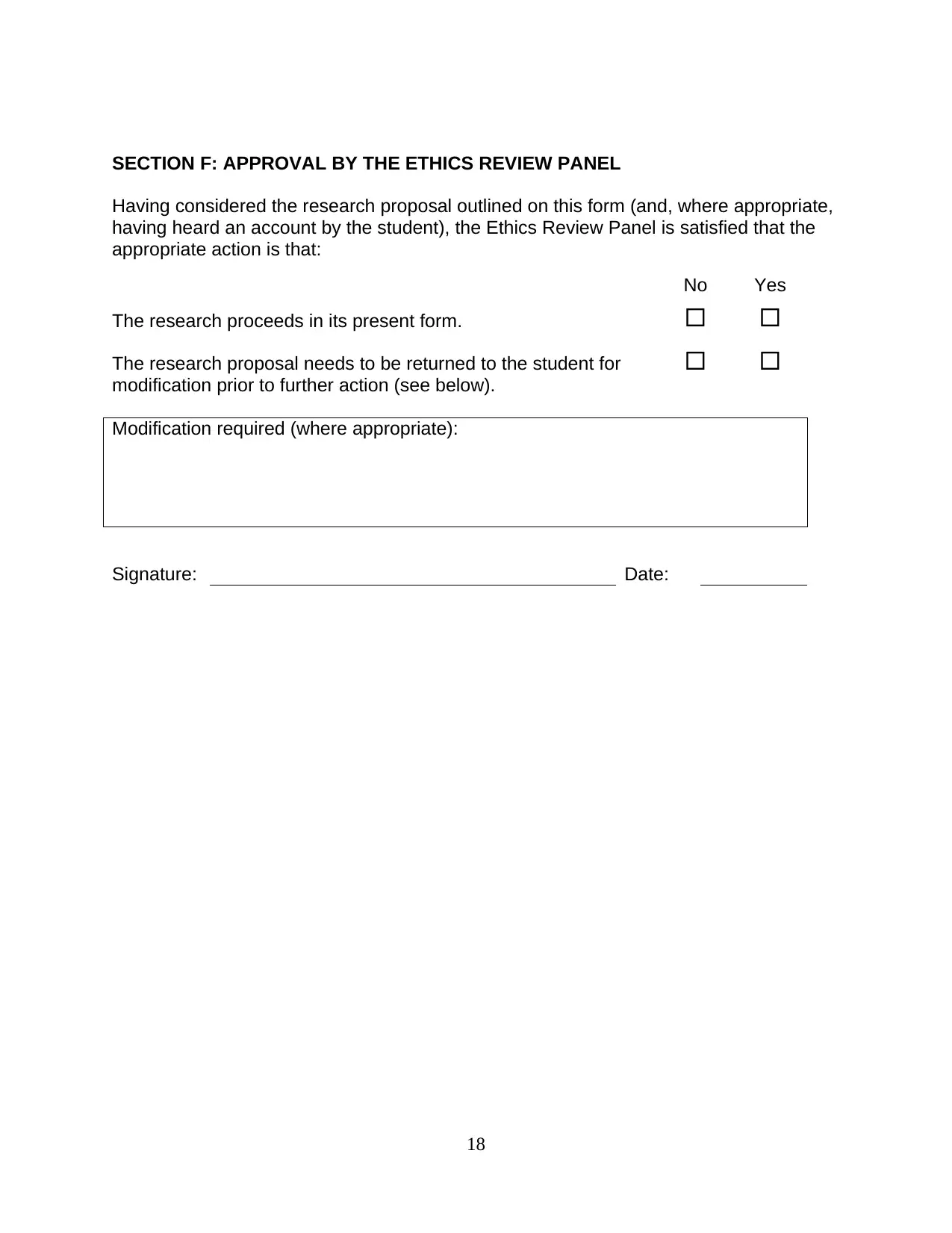
SECTION F: APPROVAL BY THE ETHICS REVIEW PANEL
Having considered the research proposal outlined on this form (and, where appropriate,
having heard an account by the student), the Ethics Review Panel is satisfied that the
appropriate action is that:
No Yes
The research proceeds in its present form.
The research proposal needs to be returned to the student for
modification prior to further action (see below).
Modification required (where appropriate):
Signature: Date:
18
Having considered the research proposal outlined on this form (and, where appropriate,
having heard an account by the student), the Ethics Review Panel is satisfied that the
appropriate action is that:
No Yes
The research proceeds in its present form.
The research proposal needs to be returned to the student for
modification prior to further action (see below).
Modification required (where appropriate):
Signature: Date:
18
1 out of 20
Related Documents
Your All-in-One AI-Powered Toolkit for Academic Success.
+13062052269
info@desklib.com
Available 24*7 on WhatsApp / Email
![[object Object]](/_next/static/media/star-bottom.7253800d.svg)
Unlock your academic potential
© 2024 | Zucol Services PVT LTD | All rights reserved.





